
shark-chat-js
Modern Chat App written in Next.js
Stars: 84
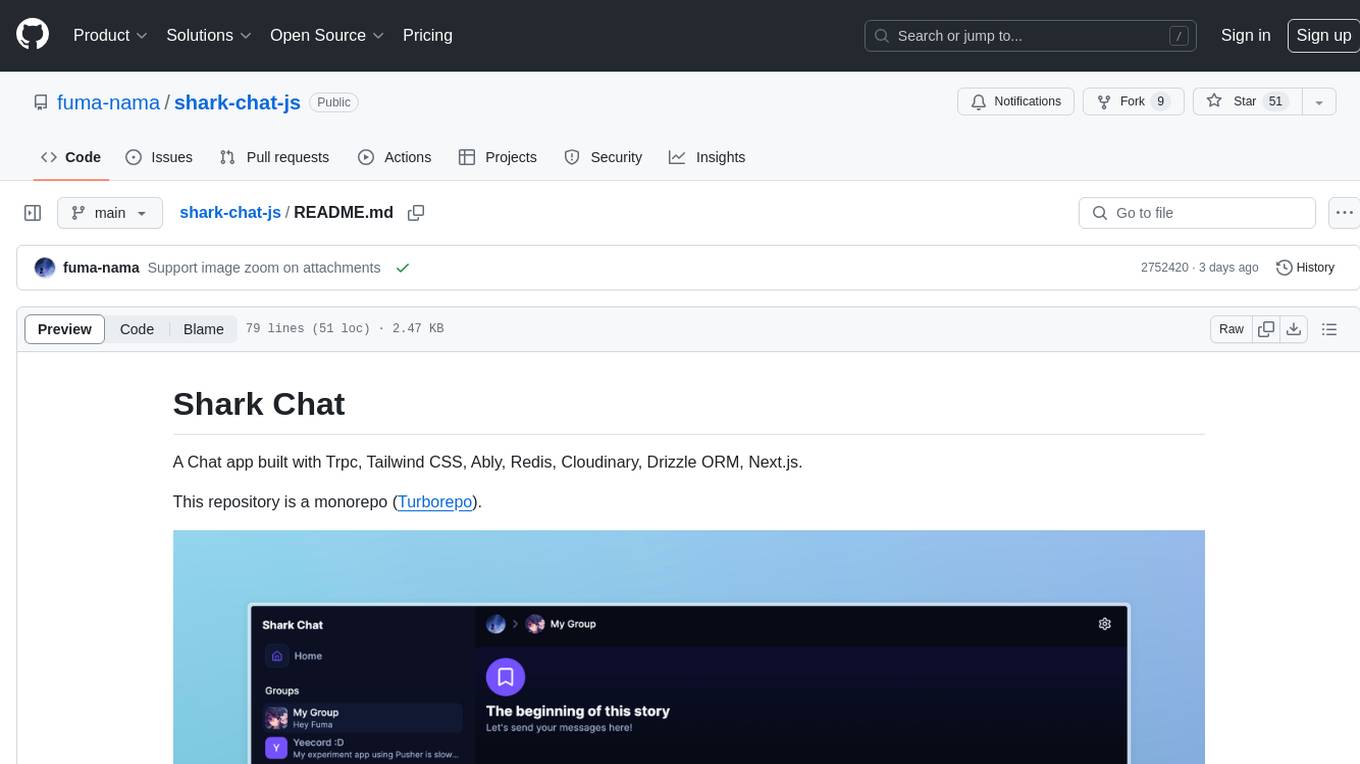
Shark Chat is a feature-rich chat application built with Trpc, Tailwind CSS, Ably, Redis, Cloudinary, Drizzle ORM, and Next.js. It allows users to create, update, and delete chat groups, send messages with markdown support, reference messages, embed links, send images/files, have direct messages, manage group members, upload images, receive notifications, use AI-powered features, delete accounts, and switch between light and dark modes. The project is 100% TypeScript and can be played with online or locally after setting up various third-party services.
README:
A Chat app built with Trpc, Tailwind CSS, Ably, Redis, Cloudinary, Drizzle ORM, Next.js.
This repository is a monorepo (Turborepo).
- Create, Update, Delete Chat Group
- Send, Update, Delete Message
- Markdown (gfm, tables supported), Code highlighting, LaTeX in Messages
- Reference Messages
- Message Embeds (Display open-graph data of links in message)
- Send Images/Files via Message, images zoom-in
- Direct Message with anyone
- View & Kick Group members
- Custom Emotes
- Invite Group members via Invite code or Url
- Upload user avatar, group banner and icon images
- Show notification when new Message received
- AI-Powered Message Writer
- Built-in AI Chatbot (Powered by Inworld)
- Delete Accounts
- Light & Dark Mode
- 100% Typescript
Play with it: https://shark-chat.vercel.app
Learn More: https://shark-chat.vercel.app/info
Shark Chat integrated with many third-party service for supporting wide spectrum of features and work perfectly on serverless environment.
Thus, you have to register an account for each services in order to setup the project correctly before playing with it locally. Please fill all environment variables in the .env.example.
Create a Redis database at their website and get REDIS_URL, REDIS_TOKEN from the console.
Create a new project on https://ably.com, paste ABLY_API_KEY into environment varibles.
By default, it uses Drizzle ORM with Neon Serverless Postresql for database. You may use other providers if you prefer.
Create a Postresql database and get your DATABASE_URL.
Create a new project on https://cloudinary.com, copy the cloud name, key and API secret.
Fill NEXTAUTH_URL and NEXTAUTH_SECRET, read their docs for further details.
Currently, only Github OAuth is supported. Follow this guide to setup the OAuth App on Github, generate a GITHUB_ID with GITHUB_SECRET.
Run pnpm run dev and edit files to see changes.
This project uses Turborepo and PNPM.
pnpm run buildIt should be able to deploy on Vercel or any other platforms.
For Tasks:
Click tags to check more tools for each tasksFor Jobs:
Alternative AI tools for shark-chat-js
Similar Open Source Tools

shark-chat-js
Shark Chat is a feature-rich chat application built with Trpc, Tailwind CSS, Ably, Redis, Cloudinary, Drizzle ORM, and Next.js. It allows users to create, update, and delete chat groups, send messages with markdown support, reference messages, embed links, send images/files, have direct messages, manage group members, upload images, receive notifications, use AI-powered features, delete accounts, and switch between light and dark modes. The project is 100% TypeScript and can be played with online or locally after setting up various third-party services.
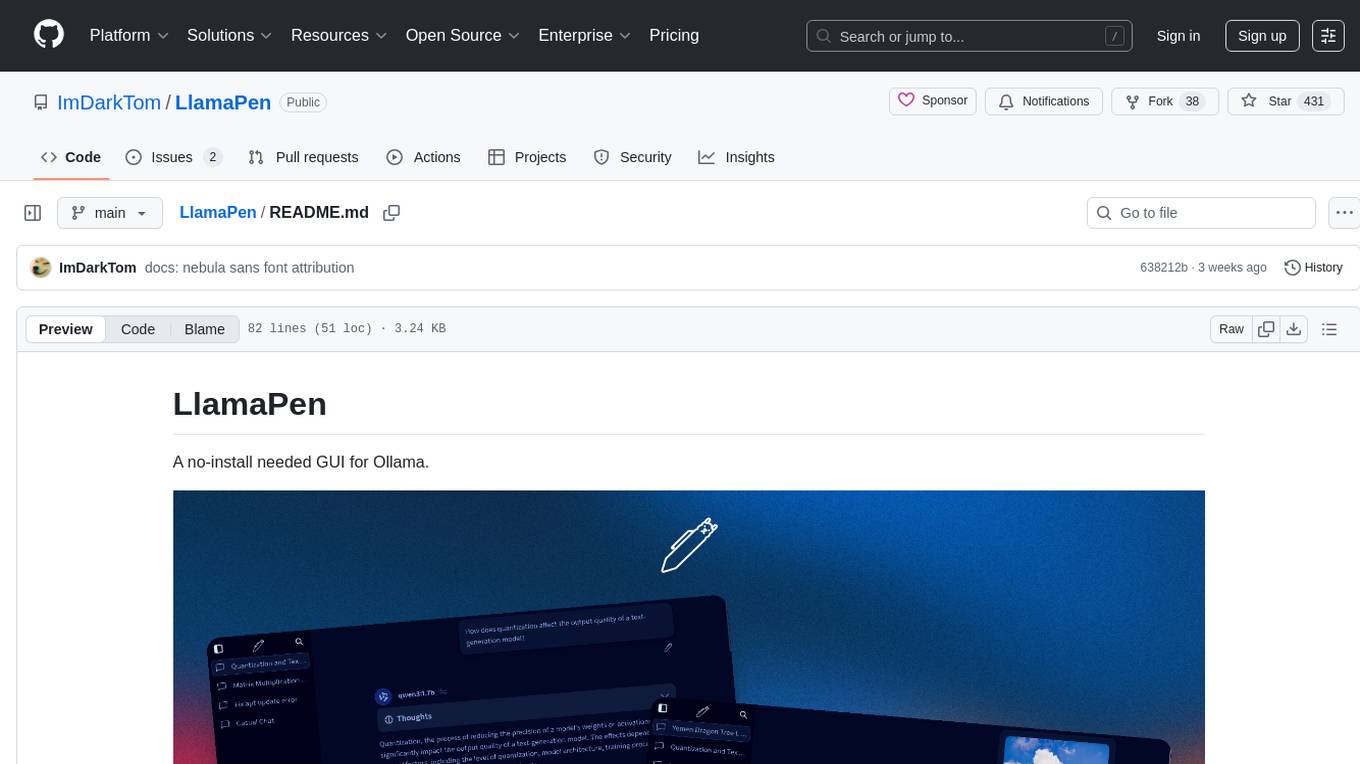
LlamaPen
LlamaPen is a no-install needed GUI tool for Ollama, featuring a web-based interface accessible on both desktop and mobile. It allows easy setup and configuration, renders markdown, text, and LaTeX math, provides keyboard shortcuts for quick navigation, includes a built-in model and download manager, supports offline and PWA, and is 100% free and open-source. Users can chat with complete privacy as all chats are stored locally in the browser, ensuring near-instant chat load times. The tool also offers an optional cloud service, LlamaPen API, for running up-to-date models if unable to run locally, with a subscription option for increased rate limits and access to more expensive models.
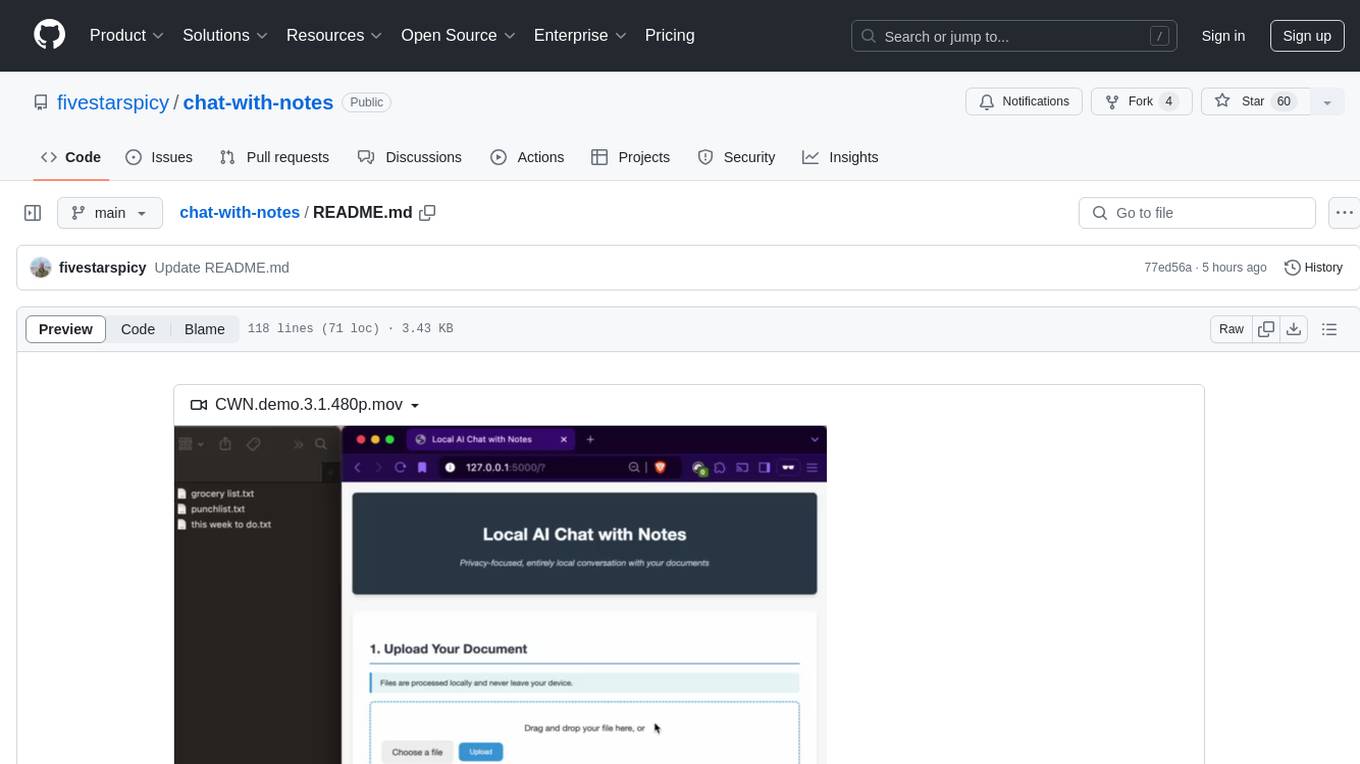
chat-with-notes
Chat-with-Notes is a Flask web application that enables users to upload text files, view their content, and engage with an AI chatbot for discussions. The application prioritizes privacy by utilizing a locally hosted Ollama Llama 3.1 (8B) model for AI responses, ensuring data security. Users can upload files during conversations, clear chat history, and export chat logs. The tool operates locally, requiring Python 3.x, pip, Git, and a locally running Ollama Llama 3.1 (8B) model as prerequisites.

twinny
Twinny is a free and open-source AI code completion plugin for Visual Studio Code and compatible editors. It integrates with various tools and frameworks, including Ollama, llama.cpp, oobabooga/text-generation-webui, LM Studio, LiteLLM, and Open WebUI. Twinny offers features such as fill-in-the-middle code completion, chat with AI about your code, customizable API endpoints, and support for single or multiline fill-in-middle completions. It is easy to install via the Visual Studio Code extensions marketplace and provides a range of customization options. Twinny supports both online and offline operation and conforms to the OpenAI API standard.
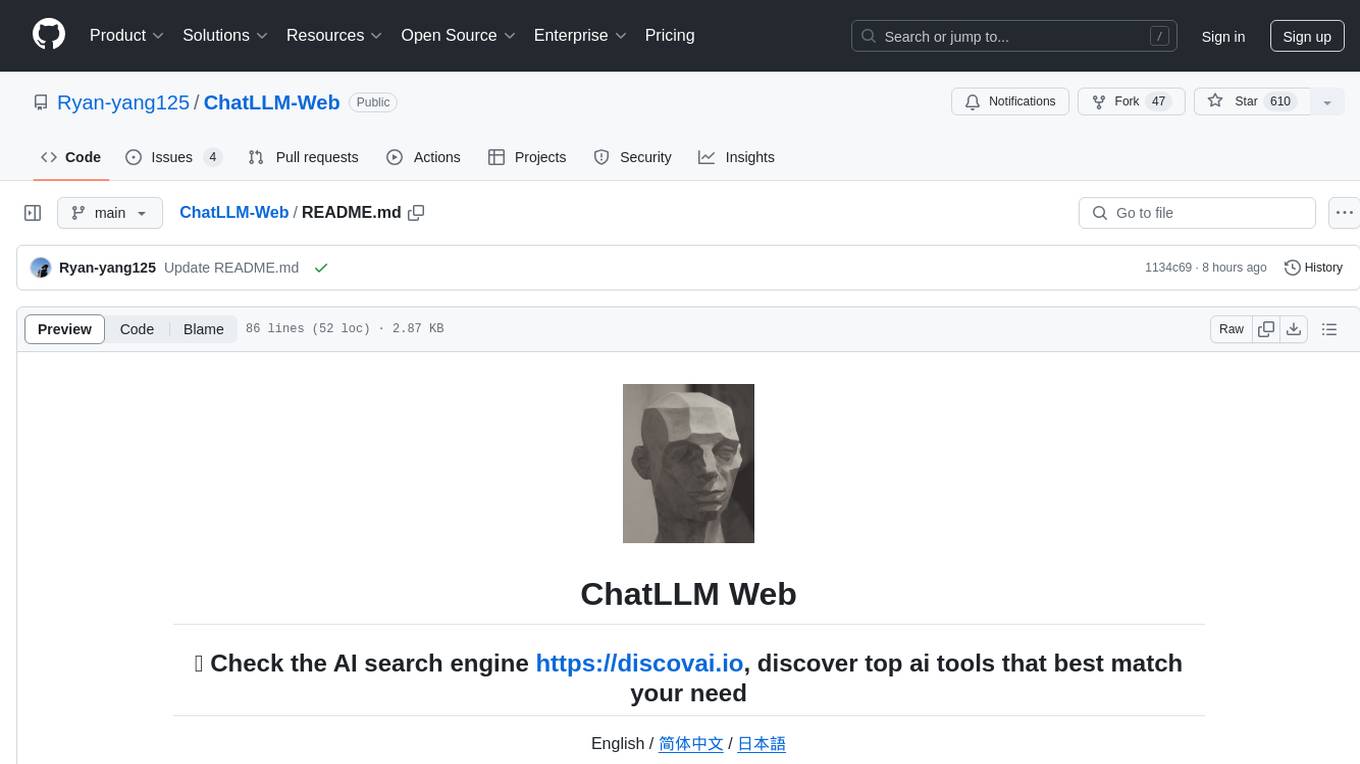
ChatLLM-Web
ChatLLM Web is a browser-based AI chat tool powered by WebGPU, providing a seamless and private chat experience. It runs models in a web worker, supports model caching, and offers multi-conversation chat with data stored locally. The tool features a well-designed UI with dark mode, PWA support for offline use, and markdown and streaming response capabilities. Users can deploy it easily on Vercel and interact with the AI like Vicuna in their browser.
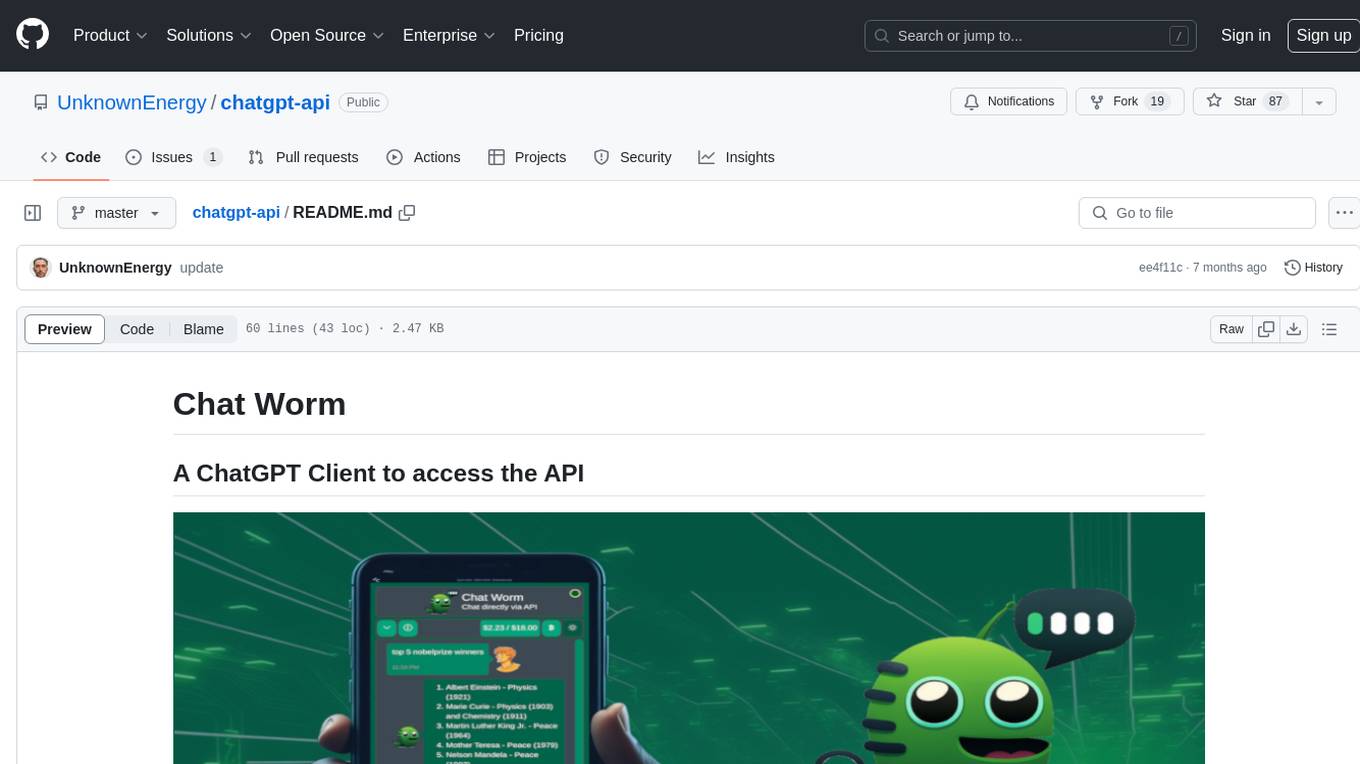
chatgpt-api
Chat Worm is a ChatGPT client that provides access to the API for generating text using OpenAI's GPT models. It works as a single-page application directly communicating with the API, allowing users to interact with the latest GPT-4 model if they have access. The project includes web, Android, and Windows apps for easy access. Users can set up local development, contribute improvements via pull requests, report bugs or request features on GitHub, deploy to production servers, and release on different app stores. The project is licensed under the MIT License.
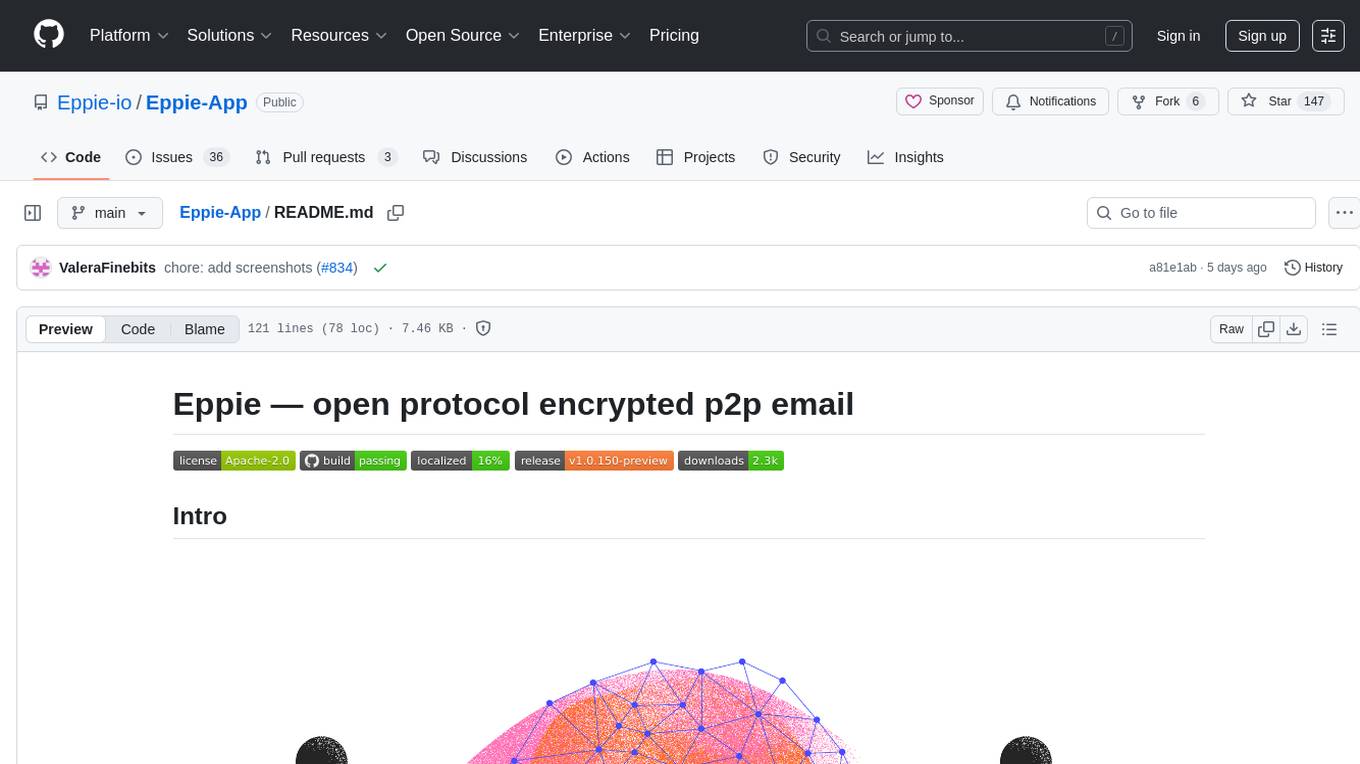
Eppie-App
Eppie-App is a mobile application designed to help users manage their daily tasks and improve productivity. The app offers features such as task organization, reminders, and goal setting to assist users in staying organized and on track with their responsibilities. With a user-friendly interface and customizable options, Eppie-App aims to simplify task management and enhance efficiency in users' daily lives.
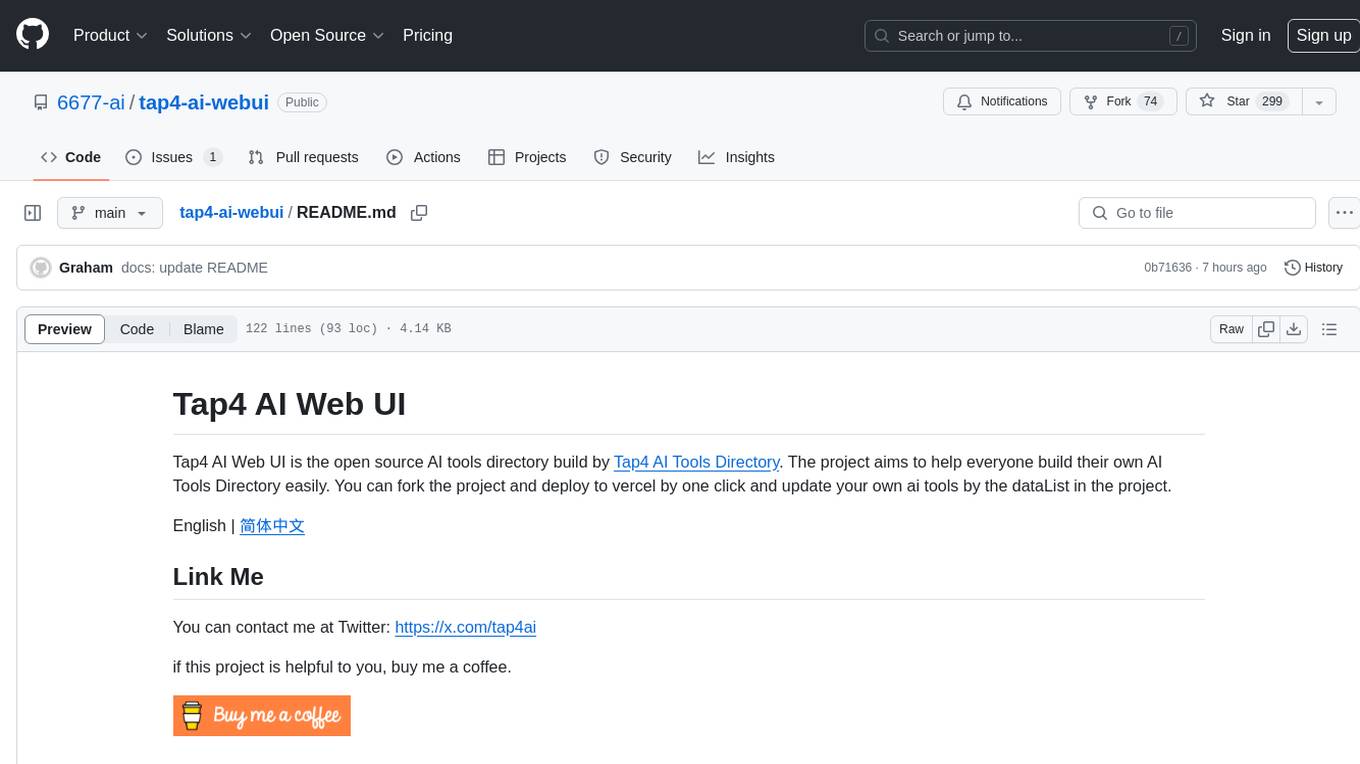
tap4-ai-webui
Tap4 AI Web UI is an open source AI tools directory built by Tap4 AI Tools Directory. The project aims to help everyone build their own AI Tools Directory easily. Users can fork the project, deploy it to Vercel with one click, and update their own AI tools using the data list in the project. The web UI features internationalization, SEO friendliness, dynamic sitemap generation, fast shipping, NEXT 14 with app route, and integration with Supabase serverless database.
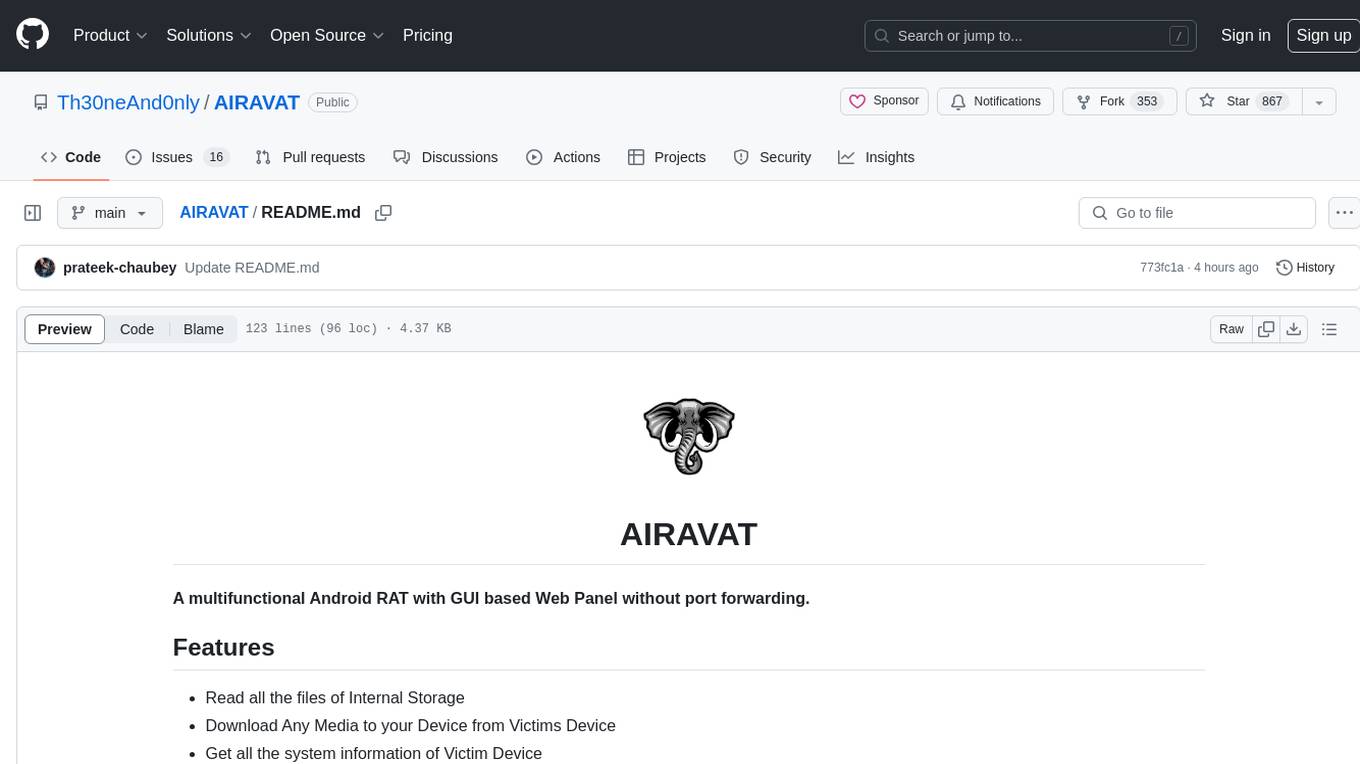
AIRAVAT
AIRAVAT is a multifunctional Android Remote Access Tool (RAT) with a GUI-based Web Panel that does not require port forwarding. It allows users to access various features on the victim's device, such as reading files, downloading media, retrieving system information, managing applications, SMS, call logs, contacts, notifications, keylogging, admin permissions, phishing, audio recording, music playback, device control (vibration, torch light, wallpaper), executing shell commands, clipboard text retrieval, URL launching, and background operation. The tool requires a Firebase account and tools like ApkEasy Tool or ApkTool M for building. Users can set up Firebase, host the web panel, modify Instagram.apk for RAT functionality, and connect the victim's device to the web panel. The tool is intended for educational purposes only, and users are solely responsible for its use.
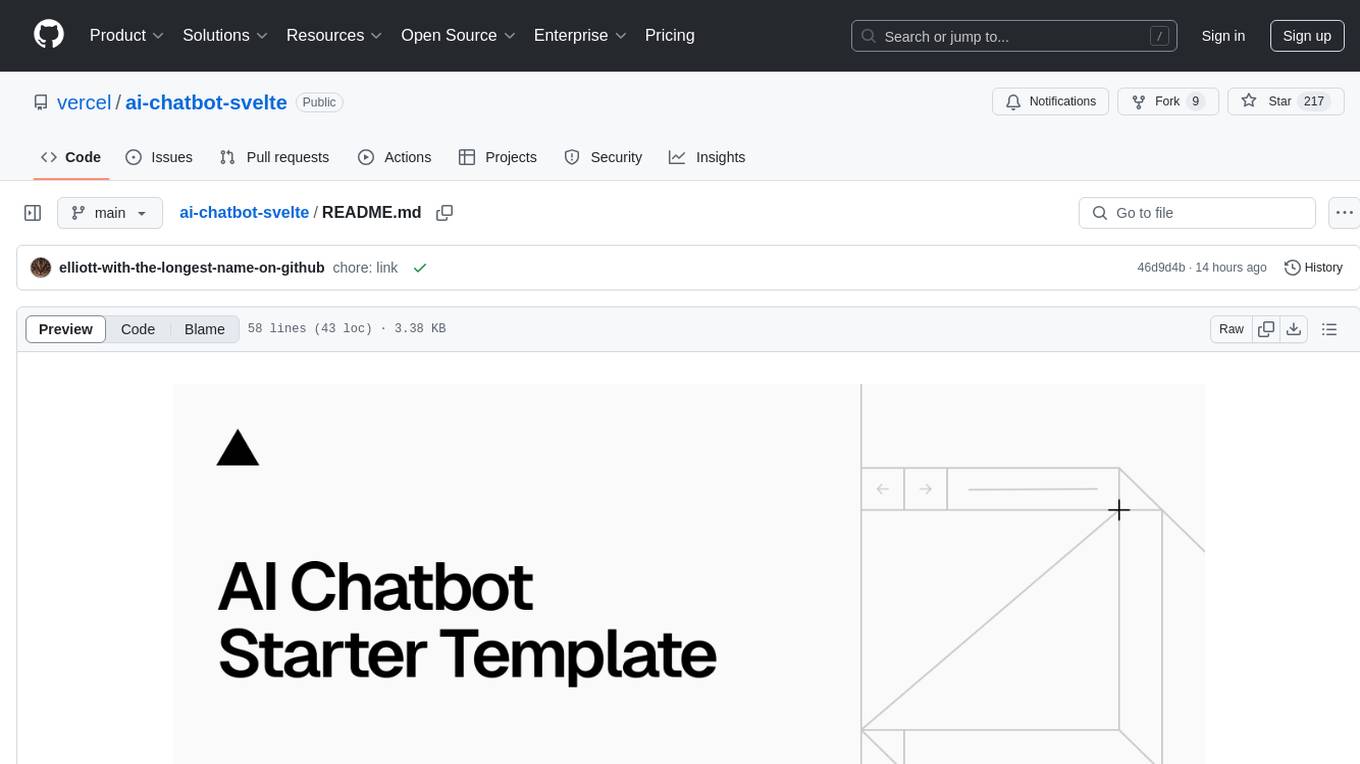
ai-chatbot-svelte
SvelteKit AI Chatbot is an open-source template built with SvelteKit and the AI SDK by Vercel. It provides a unified API for generating text, structured objects, and tool calls with LLMs. The template includes hooks for building dynamic chat and generative user interfaces, supports various model providers, and offers styling with Tailwind CSS. Data persistence is ensured with Vercel Postgres and Blob for saving chat history and user data. Users can easily deploy their own version of the chatbot to Vercel with one click and run it locally using the provided environment variables.
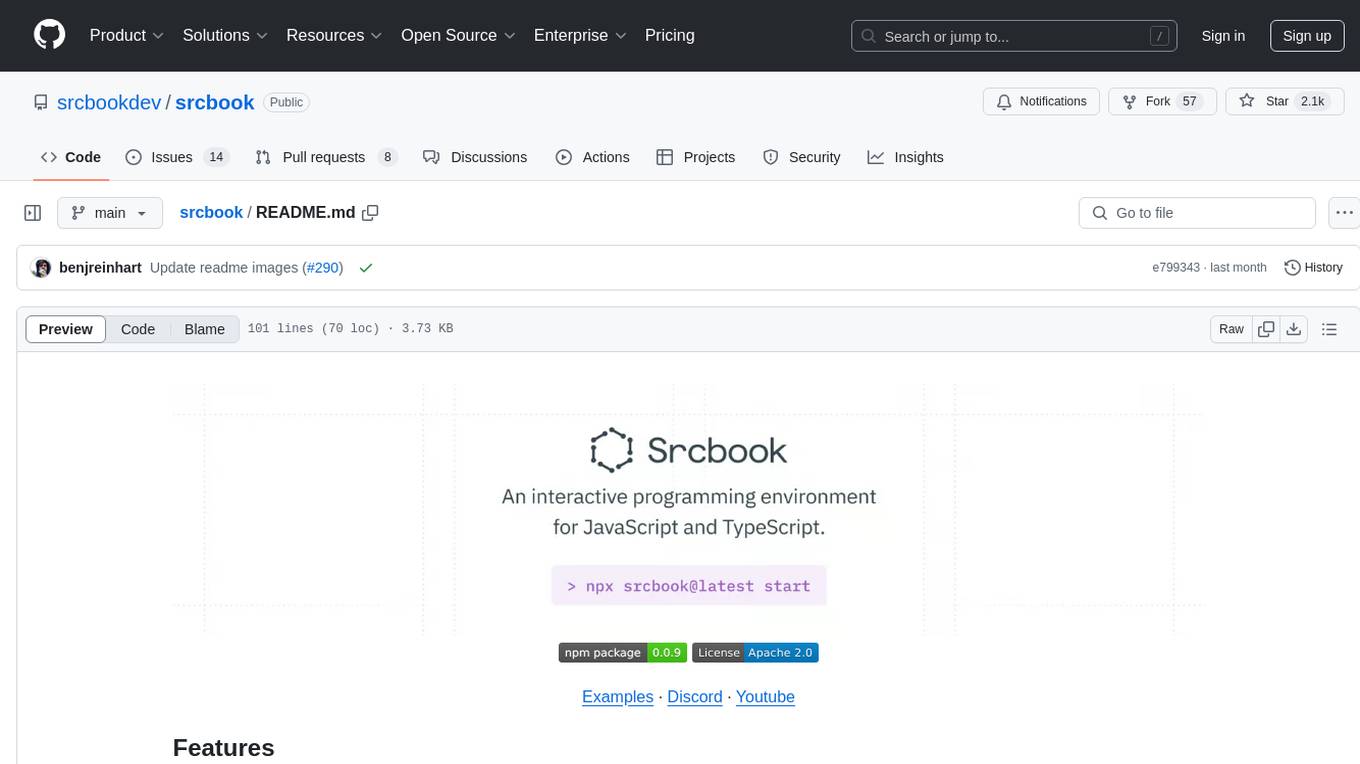
srcbook
Srcbook is an open-source interactive programming environment for TypeScript that allows users to create, run, and share reproducible programs and ideas. It features AI capabilities for exploring and iterating on ideas, supports exporting to valid markdown format, and enables diagraming with mermaid for rich annotations. Users can locally execute programs through a web interface, powered by Node.js under the Apache2 license.
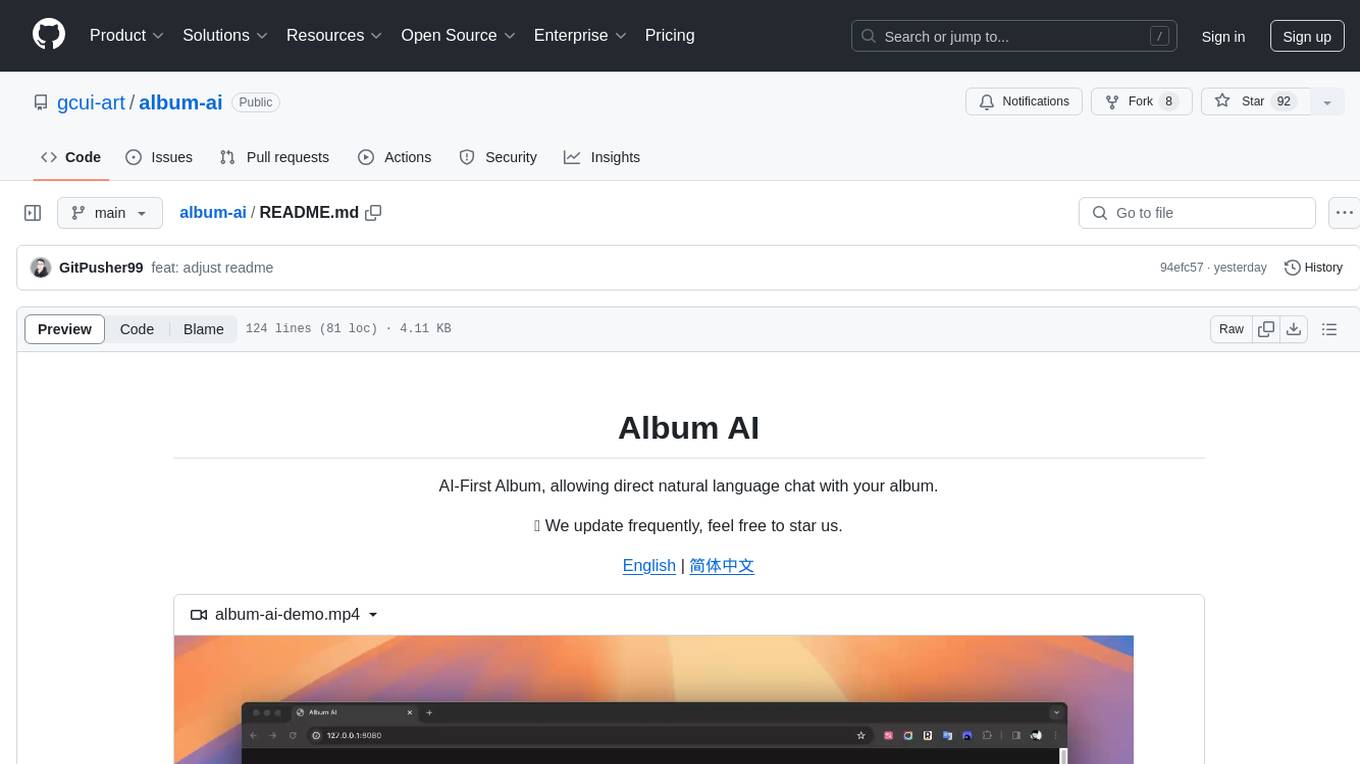
album-ai
Album AI is an experimental project that uses GPT-4o-mini to automatically identify metadata from image files in the album. It leverages RAG technology to enable conversations with the album, serving as a photo album or image knowledge base to assist in content generation. The tool provides APIs for search and chat functionalities, supports one-click deployment to platforms like Render, and allows for integration and modification under a permissive open-source license.
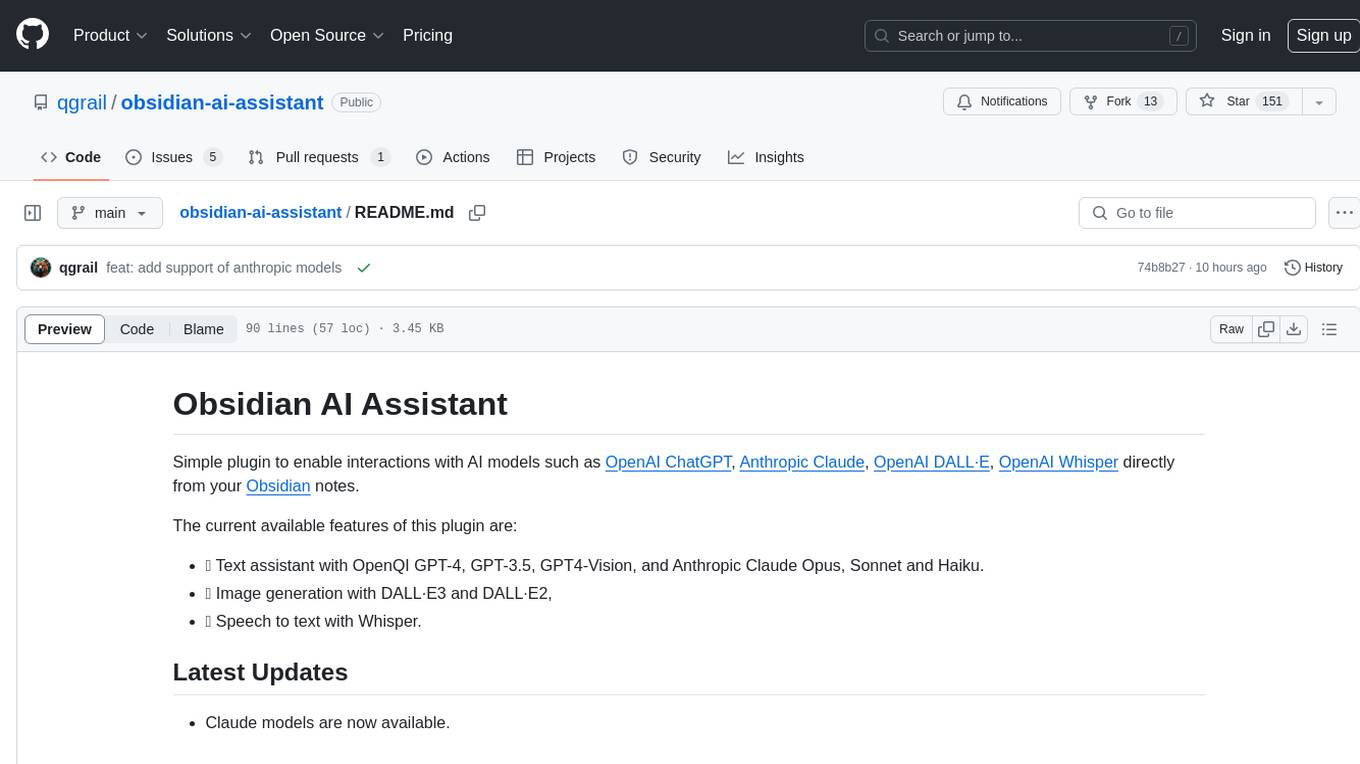
obsidian-ai-assistant
Obsidian AI Assistant is a simple plugin that enables interactions with various AI models such as OpenAI ChatGPT, Anthropic Claude, OpenAI DALL·E, and OpenAI Whisper directly from Obsidian notes. The plugin offers features like text assistance, image generation, and speech-to-text functionality. Users can chat with the AI assistant, generate images for notes, and dictate notes using speech-to-text. The plugin allows customization of text models, image generation options, and language settings for speech-to-text. It requires official API keys for using OpenAI and Anthropic Claude models.
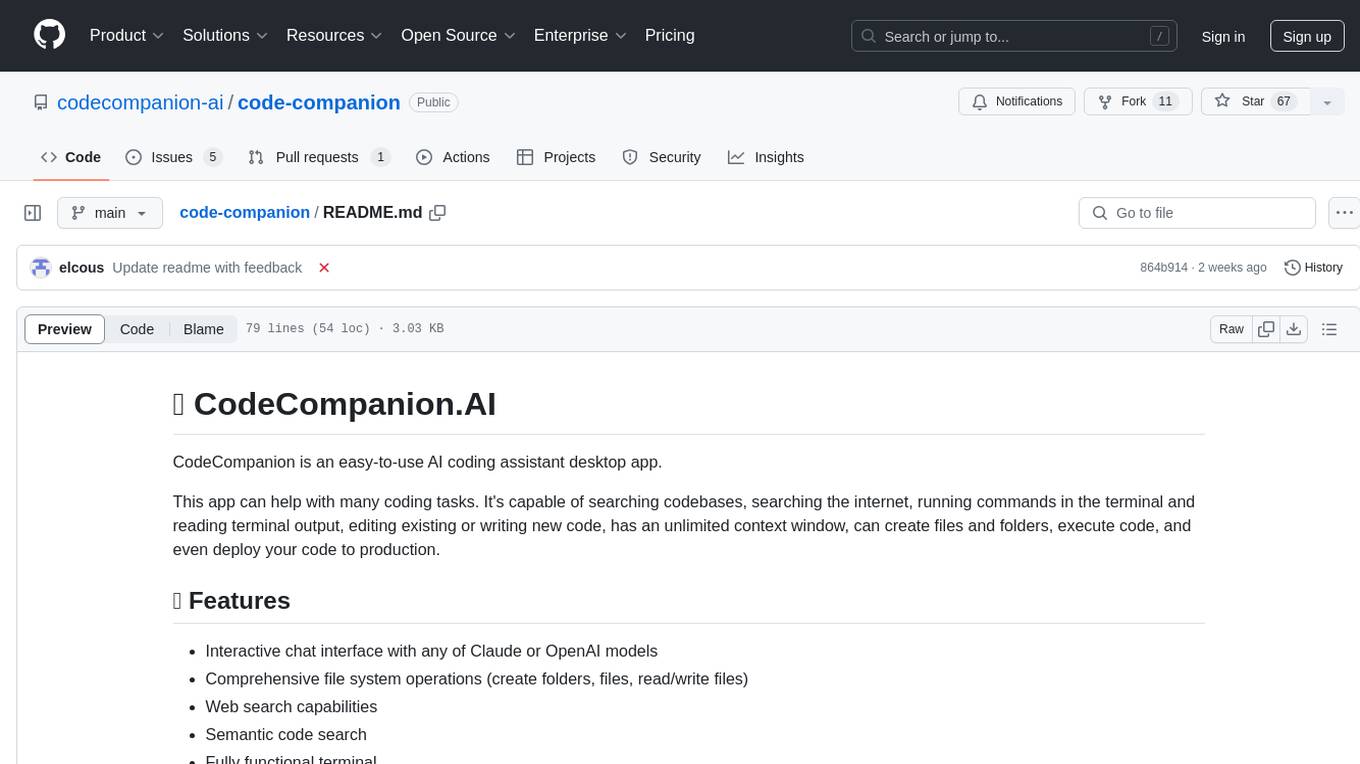
code-companion
CodeCompanion.AI is an AI coding assistant desktop app that helps with various coding tasks. It features an interactive chat interface, file system operations, web search capabilities, semantic code search, a fully functional terminal, code preview and approval, unlimited context window, dynamic context management, and more. Users can save chat conversations and set custom instructions per project.
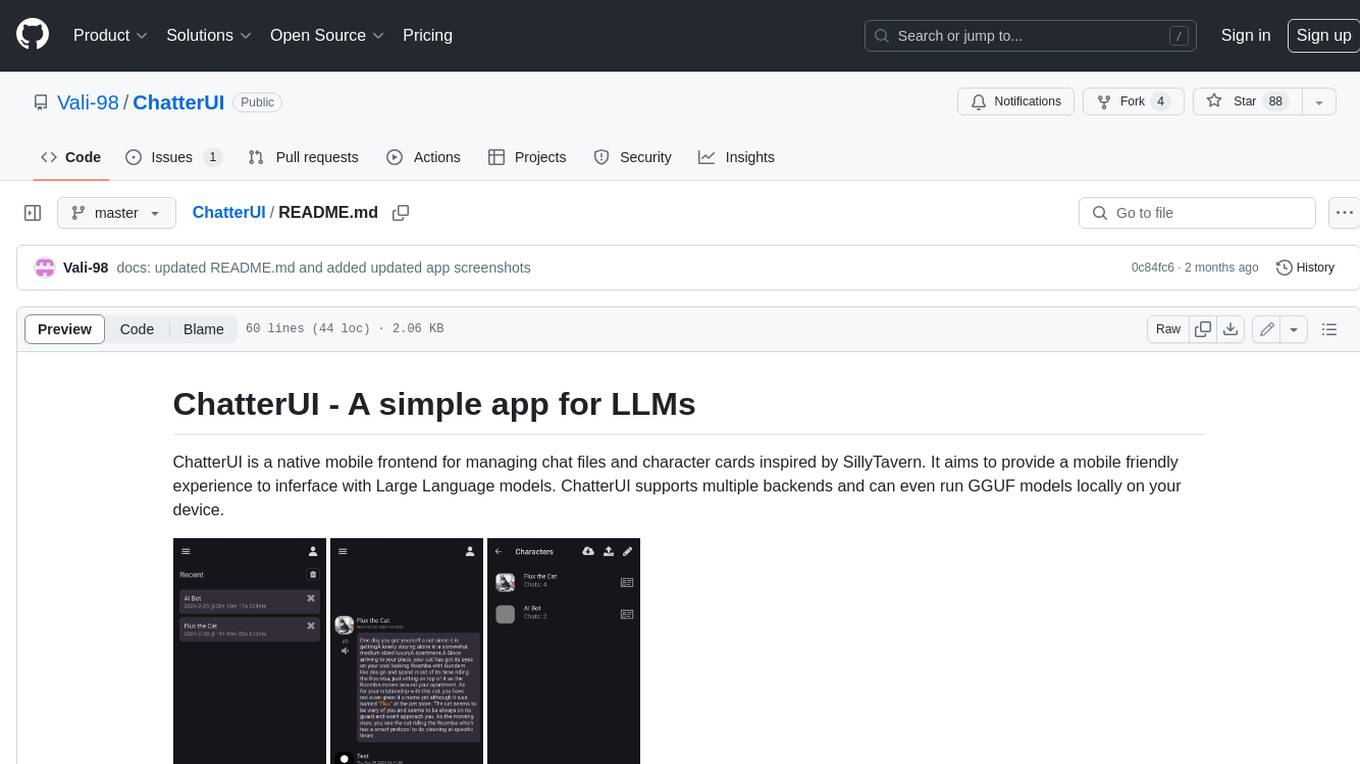
ChatterUI
ChatterUI is a mobile app that allows users to manage chat files and character cards, and to interact with Large Language Models (LLMs). It supports multiple backends, including local, koboldcpp, text-generation-webui, Generic Text Completions, AI Horde, Mancer, Open Router, and OpenAI. ChatterUI provides a mobile-friendly interface for interacting with LLMs, making it easy to use them for a variety of tasks, such as generating text, translating languages, writing code, and answering questions.
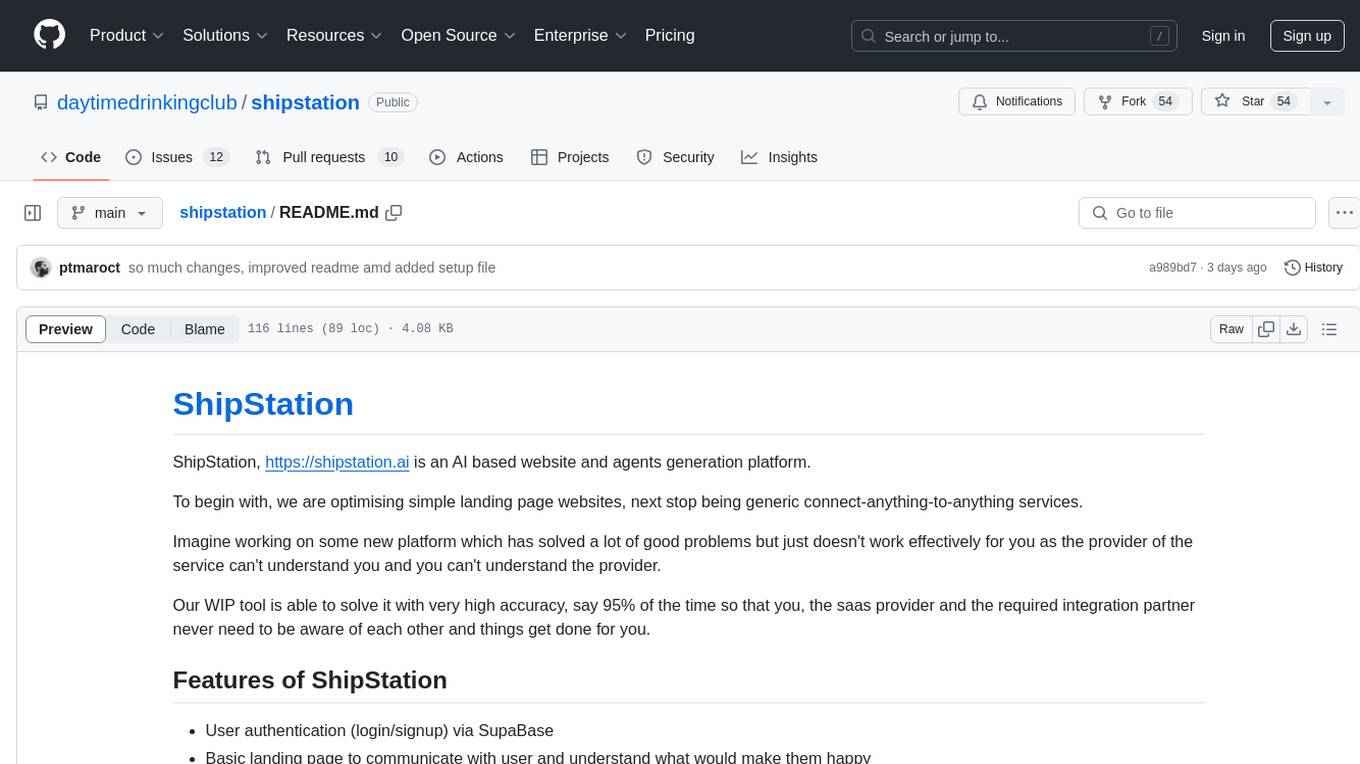
shipstation
ShipStation is an AI-based website and agents generation platform that optimizes landing page websites and generic connect-anything-to-anything services. It enables seamless communication between service providers and integration partners, offering features like user authentication, project management, code editing, payment integration, and real-time progress tracking. The project architecture includes server-side (Node.js) and client-side (React with Vite) components. Prerequisites include Node.js, npm or yarn, Anthropic API key, Supabase account, Tavily API key, and Razorpay account. Setup instructions involve cloning the repository, setting up Supabase, configuring environment variables, and starting the backend and frontend servers. Users can access the application through the browser, sign up or log in, create landing pages or portfolios, and get websites stored in an S3 bucket. Deployment to Heroku involves building the client project, committing changes, and pushing to the main branch. Contributions to the project are encouraged, and the license encourages doing good.
For similar tasks

shark-chat-js
Shark Chat is a feature-rich chat application built with Trpc, Tailwind CSS, Ably, Redis, Cloudinary, Drizzle ORM, and Next.js. It allows users to create, update, and delete chat groups, send messages with markdown support, reference messages, embed links, send images/files, have direct messages, manage group members, upload images, receive notifications, use AI-powered features, delete accounts, and switch between light and dark modes. The project is 100% TypeScript and can be played with online or locally after setting up various third-party services.
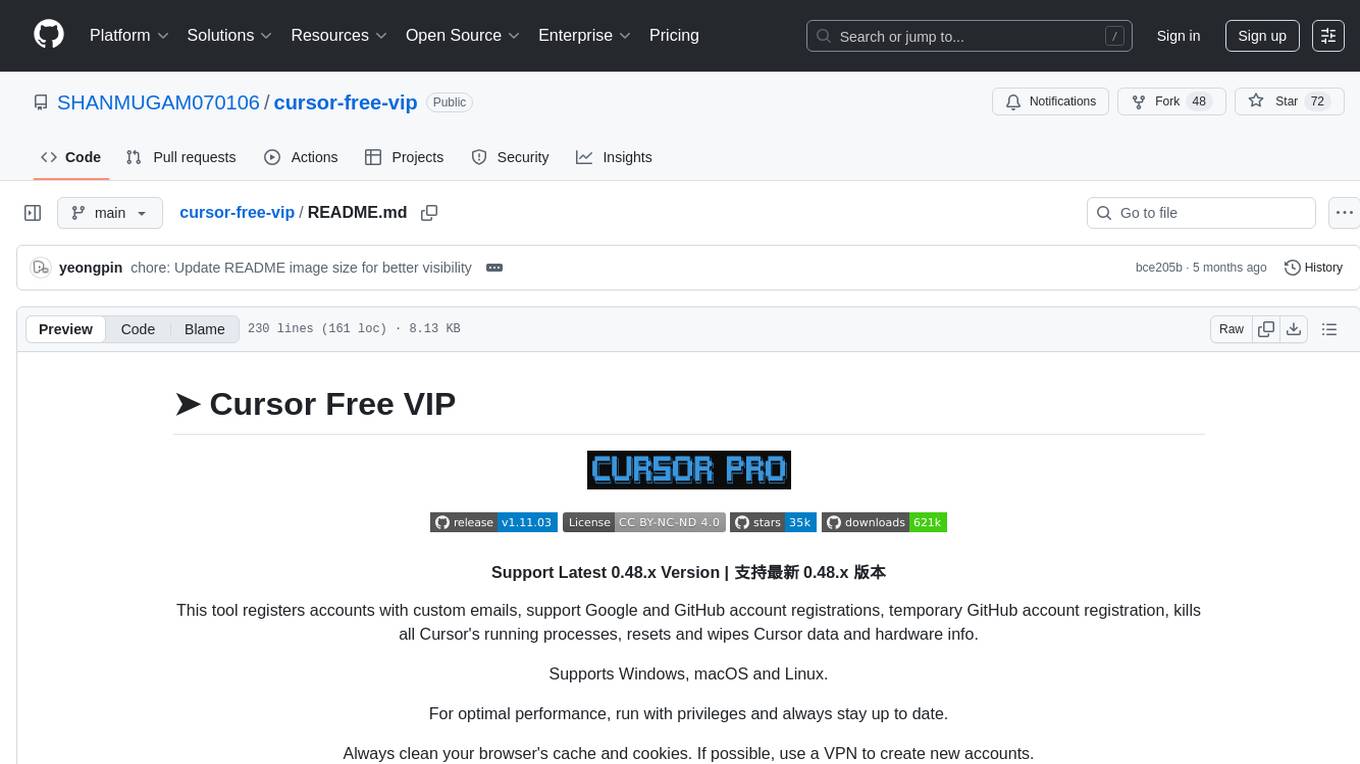
cursor-free-vip
Cursor Free VIP is an automation tool that registers accounts with custom emails, supports Google and GitHub account registrations, temporary GitHub account registration, kills all Cursor's running processes, resets and wipes Cursor data and hardware info. It supports Windows, macOS, and Linux systems. For optimal performance, run with privileges and always stay up to date. Always clean your browser's cache and cookies. The tool is designed for learning and research purposes, and users should comply with relevant software usage terms. It offers multi-language support and various features like Google OAuth Authentication, GitHub OAuth Authentication, automatic Cursor membership registration, system support for Windows, macOS, and Linux, and more.
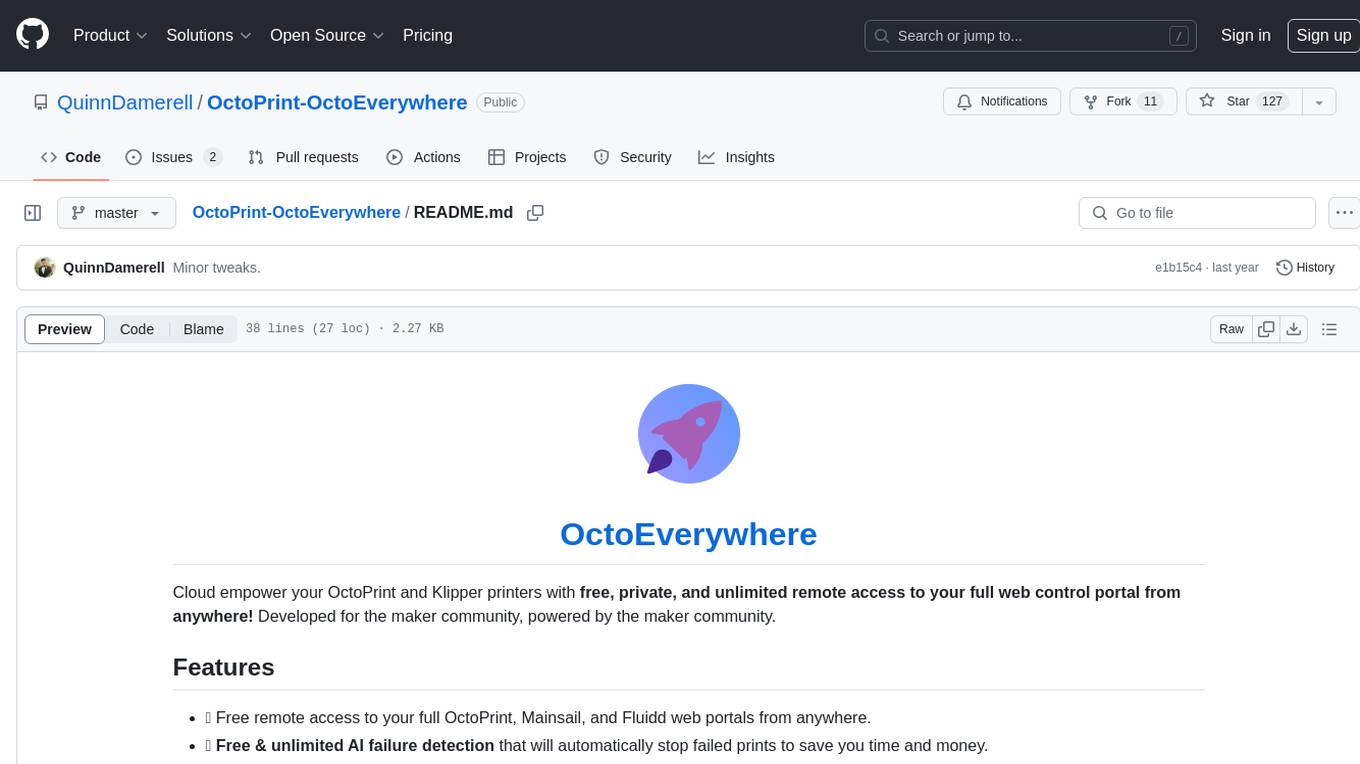
OctoPrint-OctoEverywhere
OctoEverywhere is a cloud-based tool designed to provide free, private, and unlimited remote access to OctoPrint and Klipper printers' web control portals from anywhere. It offers features such as free AI failure detection, webcam streaming, mobile app integration, live streaming, printer notifications, secure portal sharing, plugin functionality, and multicam support. With a high Trustpilot rating and a large user base, OctoEverywhere aims to empower the maker community with easy and efficient printer management.
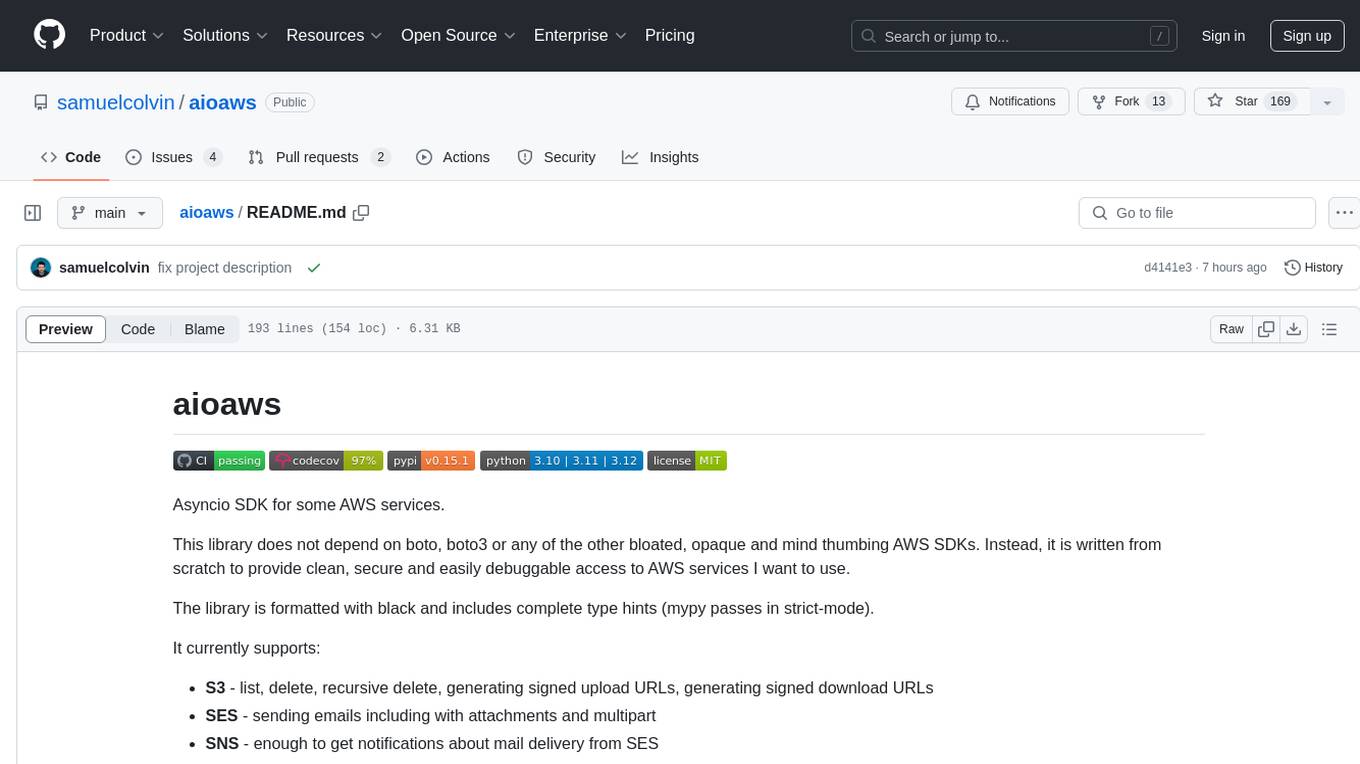
aioaws
Aioaws is an asyncio SDK for some AWS services, providing clean, secure, and easily debuggable access to services like S3, SES, and SNS. It is written from scratch without dependencies on boto or boto3, formatted with black, and includes complete type hints. The library supports various functionalities such as listing, deleting, and generating signed URLs for S3 files, sending emails with attachments and multipart content via SES, and receiving notifications about mail delivery from SES. It also offers AWS Signature Version 4 authentication and has minimal dependencies like aiofiles, cryptography, httpx, and pydantic.
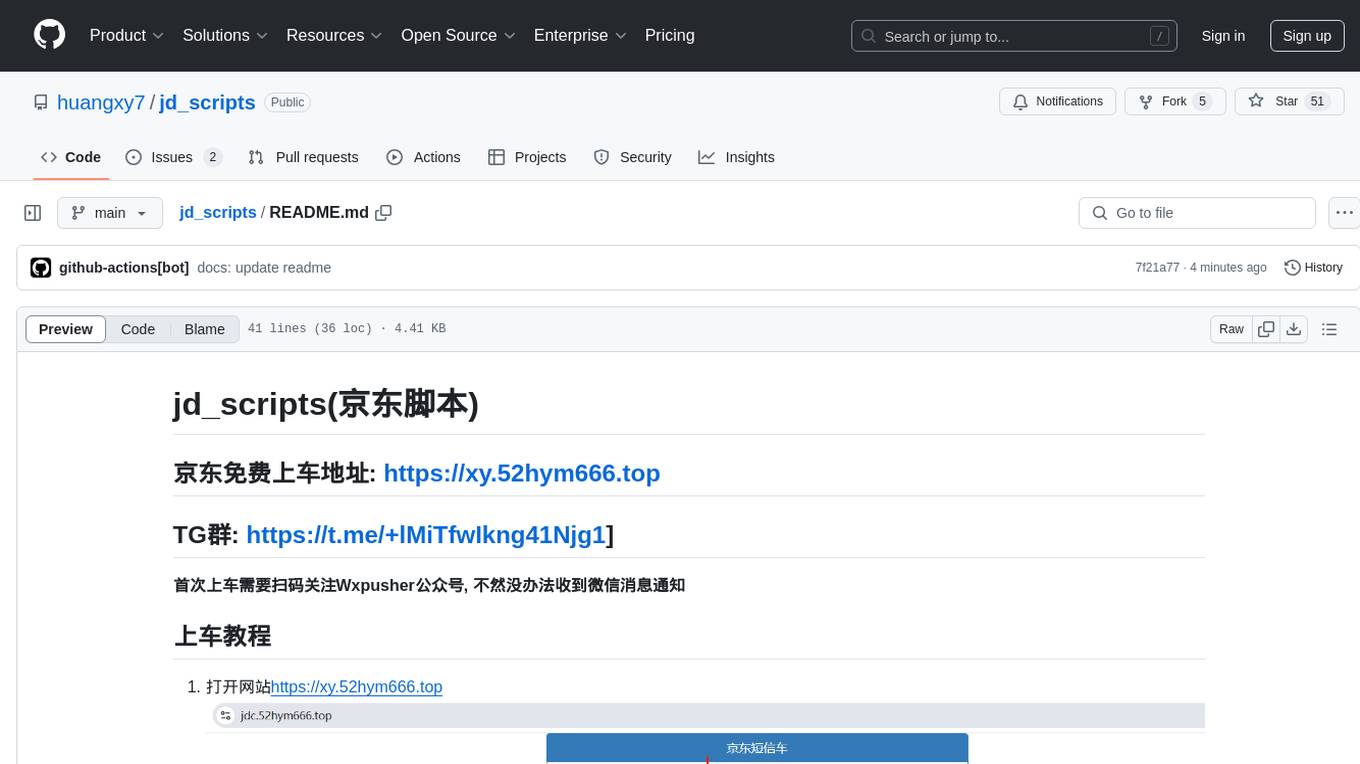
jd_scripts
jd_scripts is a repository containing scripts for automating various tasks on the JD platform. The scripts provide instructions for setting up and using the tools to enhance user experience and efficiency in managing JD accounts and assets. Users can automate processes such as receiving notifications, redeeming rewards, participating in group purchases, and monitoring ticket availability. The repository also includes resources for optimizing performance and security measures to safeguard user accounts. With a focus on simplifying interactions with the JD platform, jd_scripts offers a comprehensive solution for maximizing benefits and convenience for JD users.
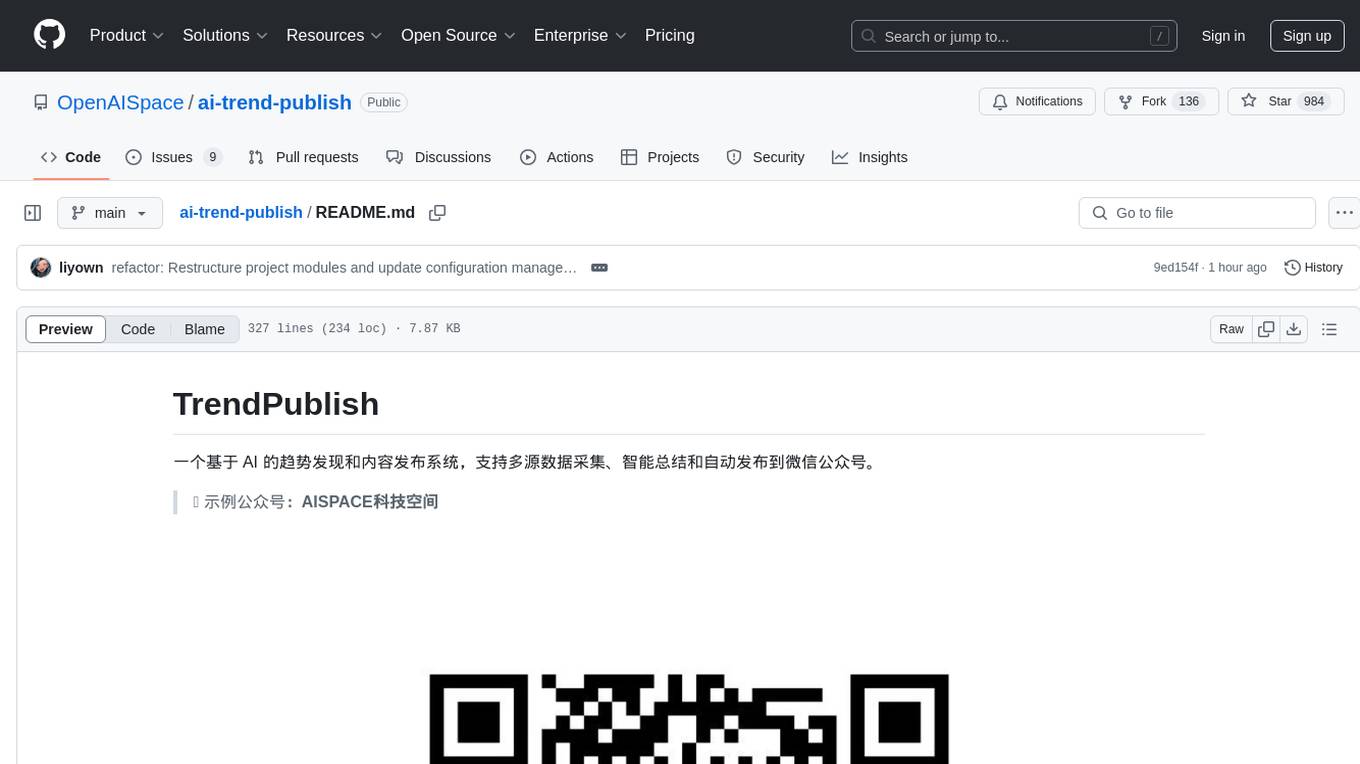
ai-trend-publish
AI TrendPublish is an AI-based trend discovery and content publishing system that supports multi-source data collection, intelligent summarization, and automatic publishing to WeChat official accounts. It features data collection from various sources, AI-powered content processing using DeepseekAI Together, key information extraction, intelligent title generation, automatic article publishing to WeChat official accounts with custom templates and scheduled tasks, notification system integration with Bark for task status updates and error alerts. The tool offers multiple templates for content customization and is built using Node.js + TypeScript with AI services from DeepseekAI Together, data sources including Twitter/X API and FireCrawl, and uses node-cron for scheduling tasks and EJS as the template engine.
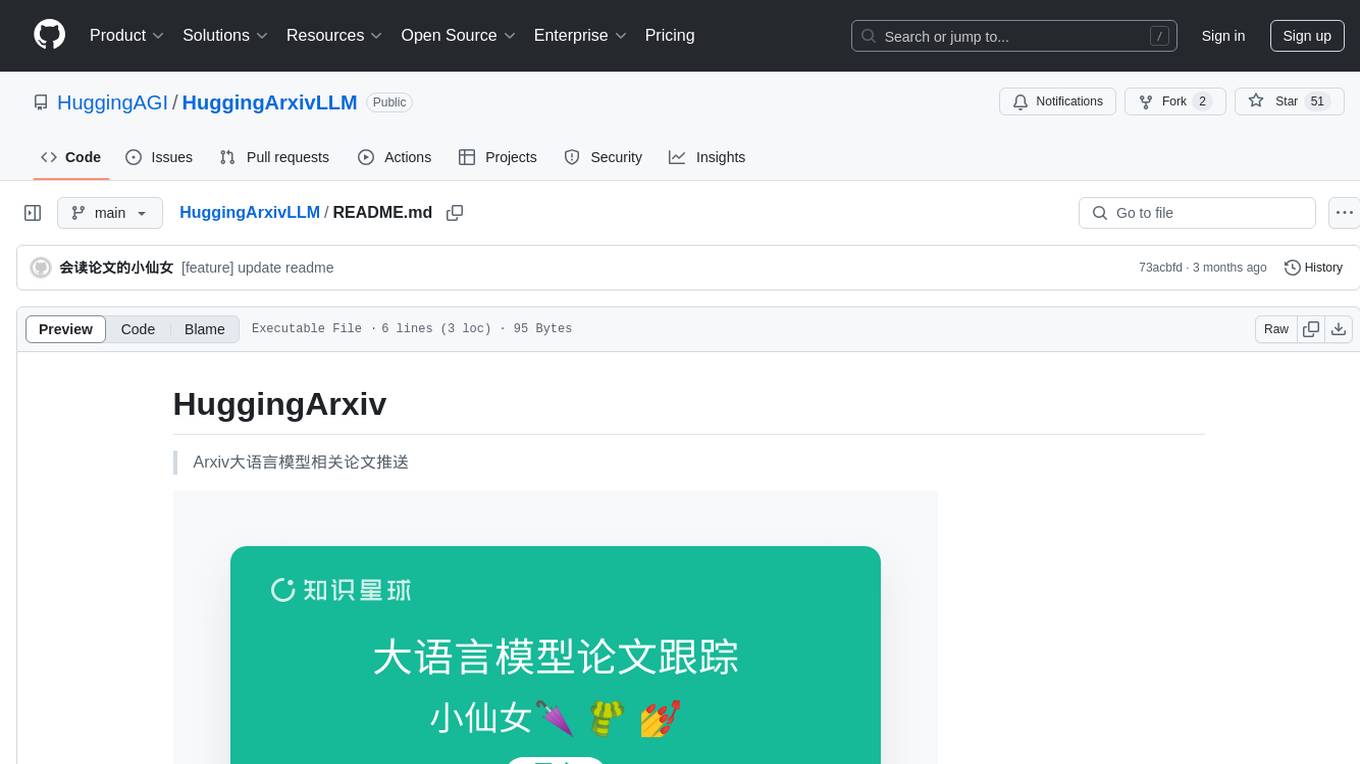
HuggingArxivLLM
HuggingArxiv is a tool designed to push research papers related to large language models from Arxiv. It helps users stay updated with the latest developments in the field of large language models by providing notifications and access to relevant papers.
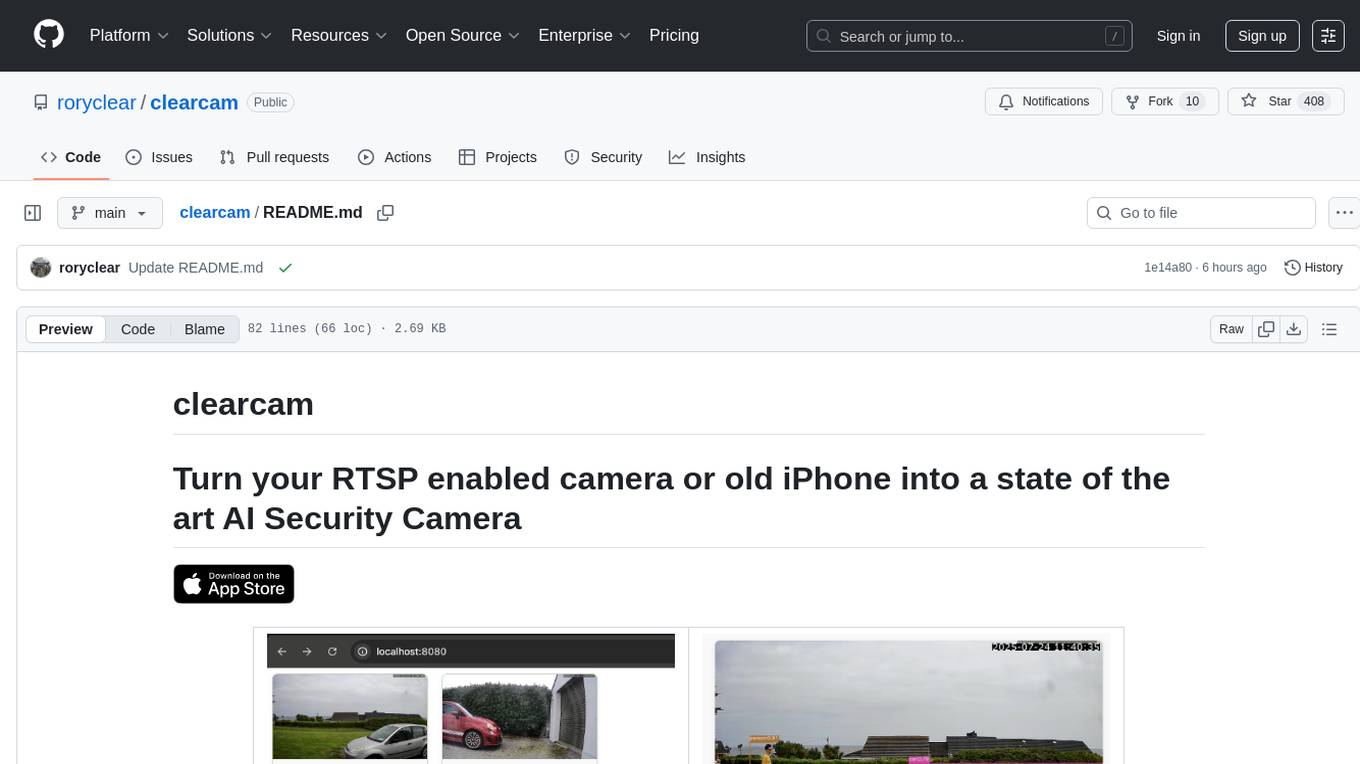
clearcam
Clearcam is a tool that allows users to turn their RTSP enabled camera or old iPhone into a state-of-the-art AI security camera. Users can install and run NVR + inference with homebrew or in Python from source. The tool also provides an iOS app for remote viewing of live camera feeds, receiving notifications on events, viewing event clips, and ensuring end-to-end encryption on all data. Users can sign up for Clearcam Premium to access additional features and functionalities.
For similar jobs

shark-chat-js
Shark Chat is a feature-rich chat application built with Trpc, Tailwind CSS, Ably, Redis, Cloudinary, Drizzle ORM, and Next.js. It allows users to create, update, and delete chat groups, send messages with markdown support, reference messages, embed links, send images/files, have direct messages, manage group members, upload images, receive notifications, use AI-powered features, delete accounts, and switch between light and dark modes. The project is 100% TypeScript and can be played with online or locally after setting up various third-party services.
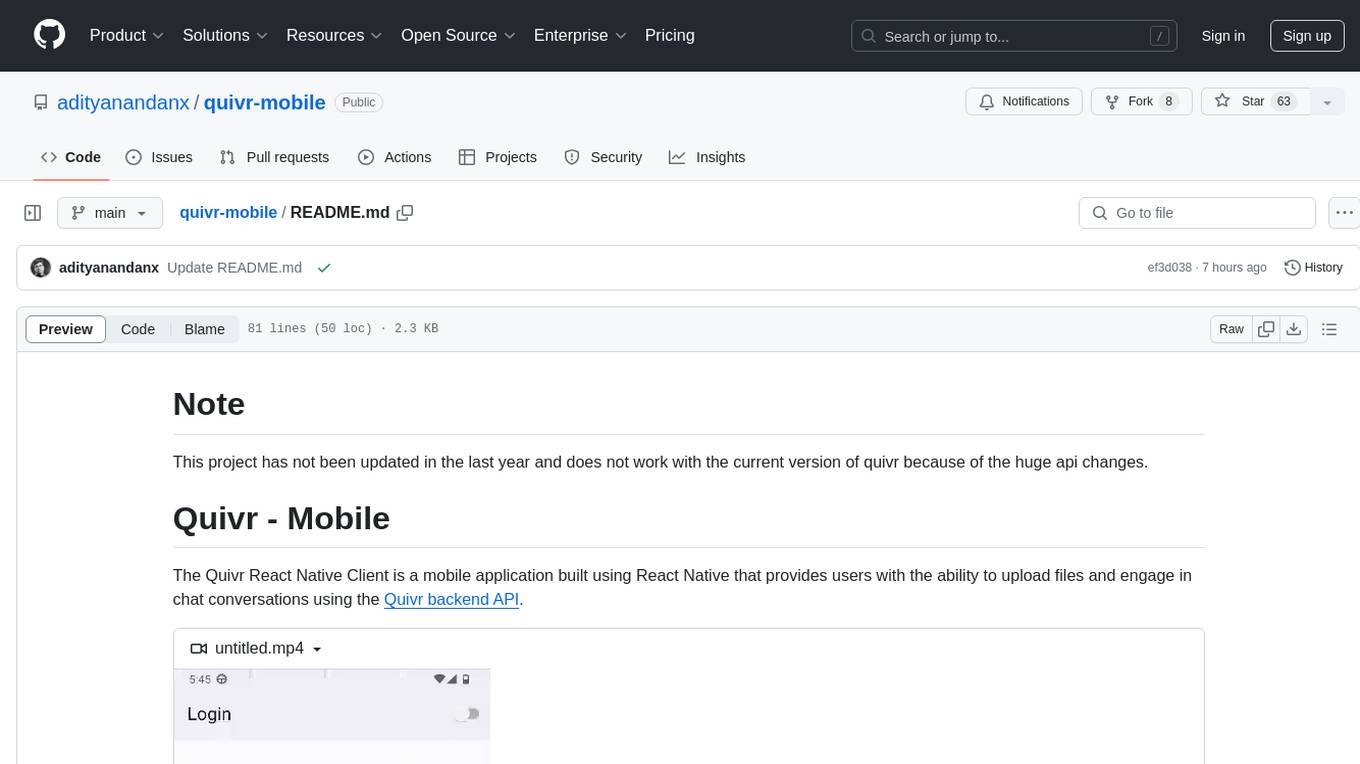
quivr-mobile
Quivr-Mobile is a React Native mobile application that allows users to upload files and engage in chat conversations using the Quivr backend API. It supports features like file upload and chatting with a language model about uploaded data. The project uses technologies like React Native, React Native Paper, and React Native Navigation. Users can follow the installation steps to set up the client and contribute to the project by opening issues or submitting pull requests following the existing coding style.
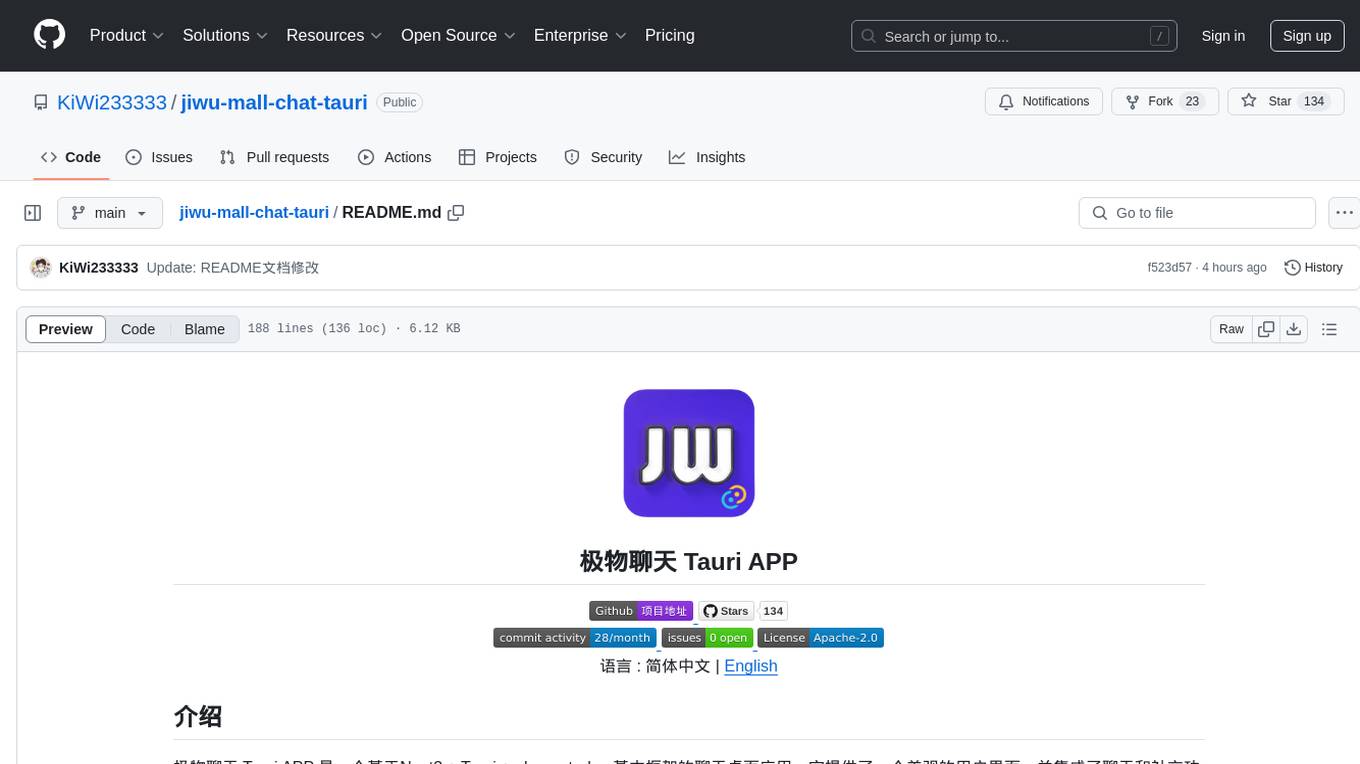
jiwu-mall-chat-tauri
Jiwu Chat Tauri APP is a desktop chat application based on Nuxt3 + Tauri + Element Plus framework. It provides a beautiful user interface with integrated chat and social functions. It also supports AI shopping chat and global dark mode. Users can engage in real-time chat, share updates, and interact with AI customer service through this application.
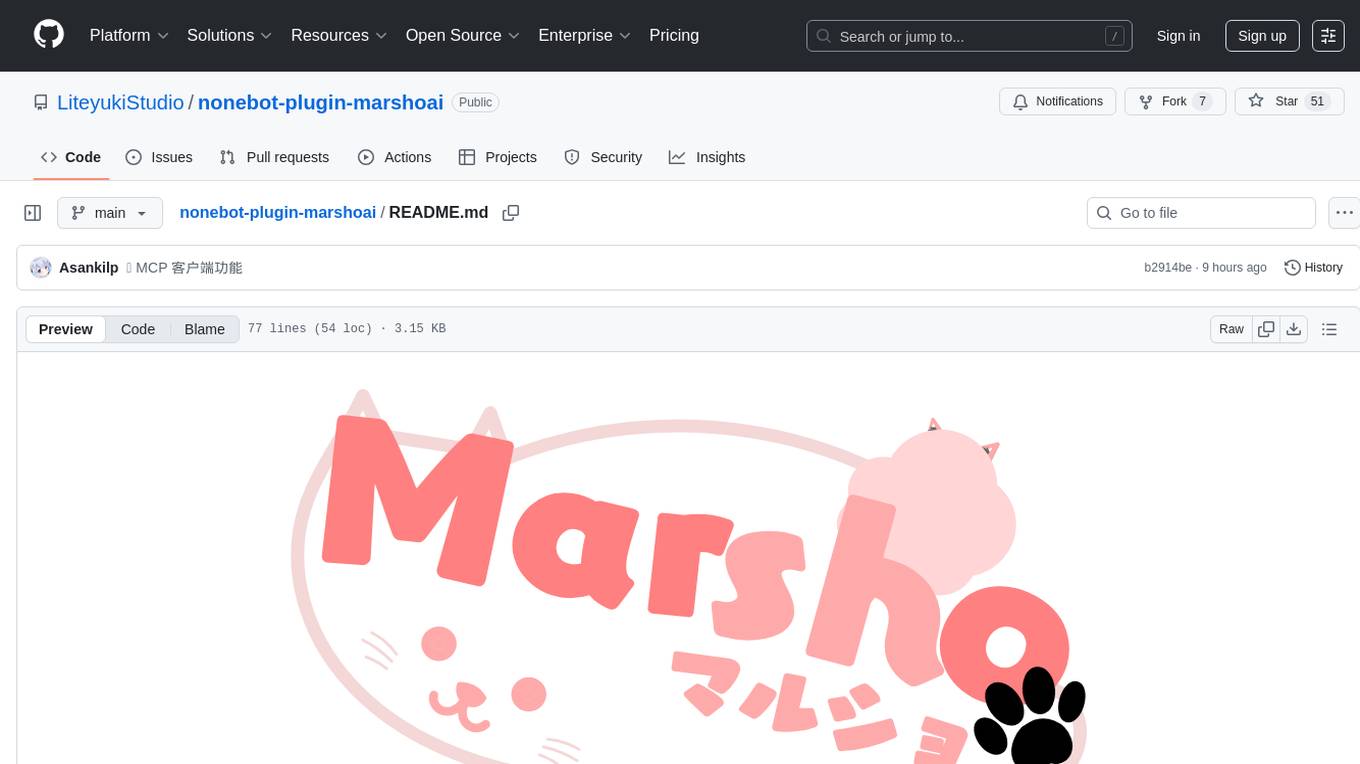
nonebot-plugin-marshoai
nonebot-plugin-marshoai is a chatbot plugin that utilizes the OpenAI standard format API, such as the GitHub Models API, to enable chat functionalities. The plugin features the character Marsho, a cute cat girl, for engaging conversations. It supports OneBot adapters and GitHub Models API, with limited validation for other adapters. Developed by Melobot.
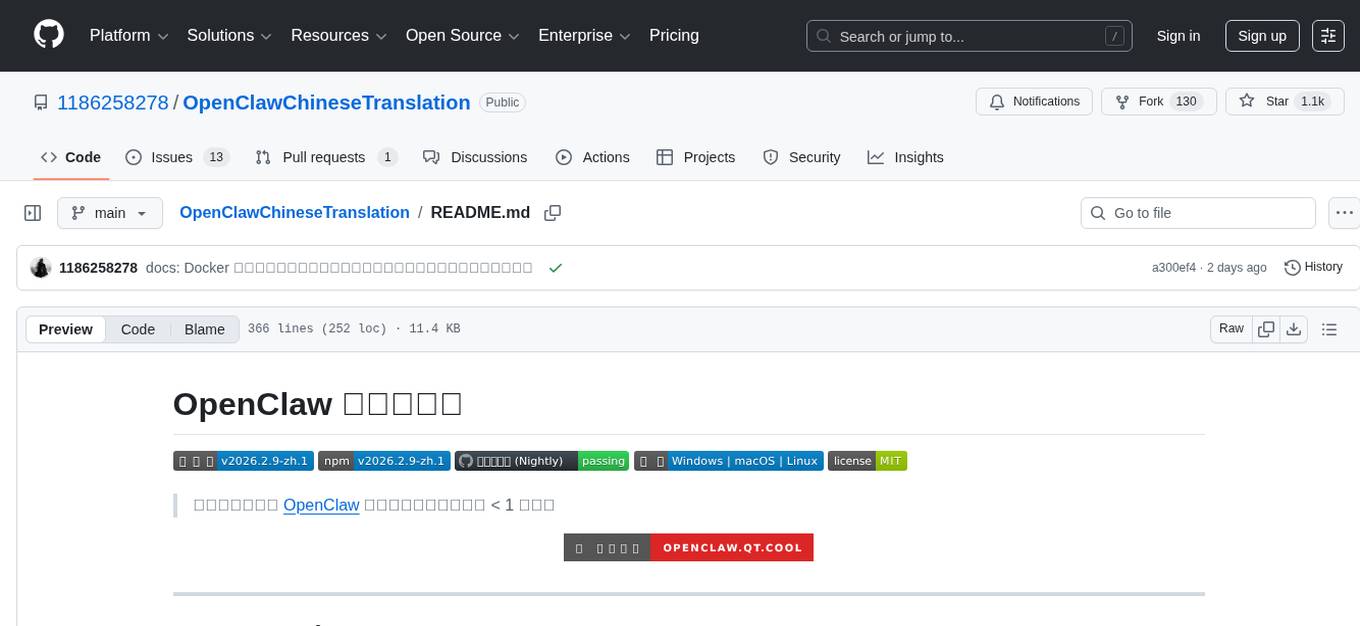
OpenClawChineseTranslation
OpenClaw Chinese Translation is a localization project that provides a fully Chinese interface for the OpenClaw open-source personal AI assistant platform. It allows users to interact with their AI assistant through chat applications like WhatsApp, Telegram, and Discord to manage daily tasks such as emails, calendars, and files. The project includes both CLI command-line and dashboard web interface fully translated into Chinese.
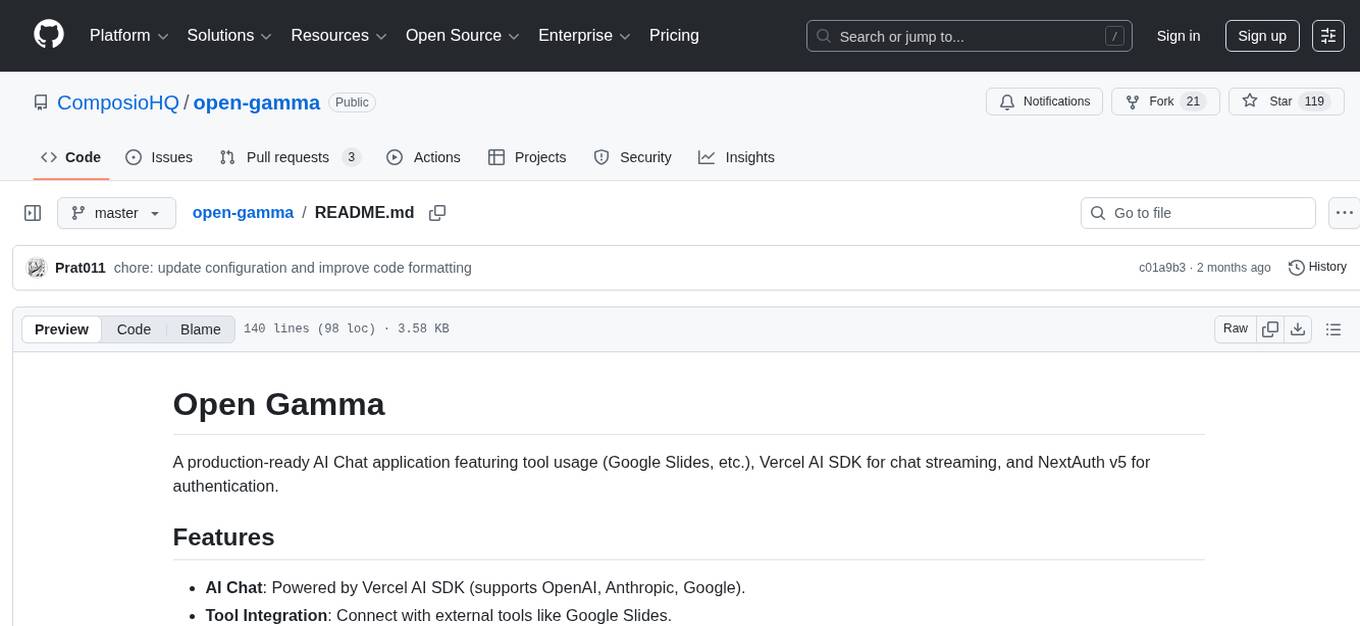
open-gamma
Open Gamma is a production-ready AI Chat application that features tool integration with Google Slides, Vercel AI SDK for chat streaming, and NextAuth v5 for authentication. It utilizes PostgreSQL with Drizzle ORM for database management and is built on Next.js 16 with Tailwind CSS for styling. The application provides AI chat functionality powered by Vercel AI SDK supporting OpenAI, Anthropic, and Google. It offers custom authentication flows and ensures security through request validation and environment validation. Open Gamma is designed to streamline chat interactions, tool integrations, and authentication processes in a secure and efficient manner.
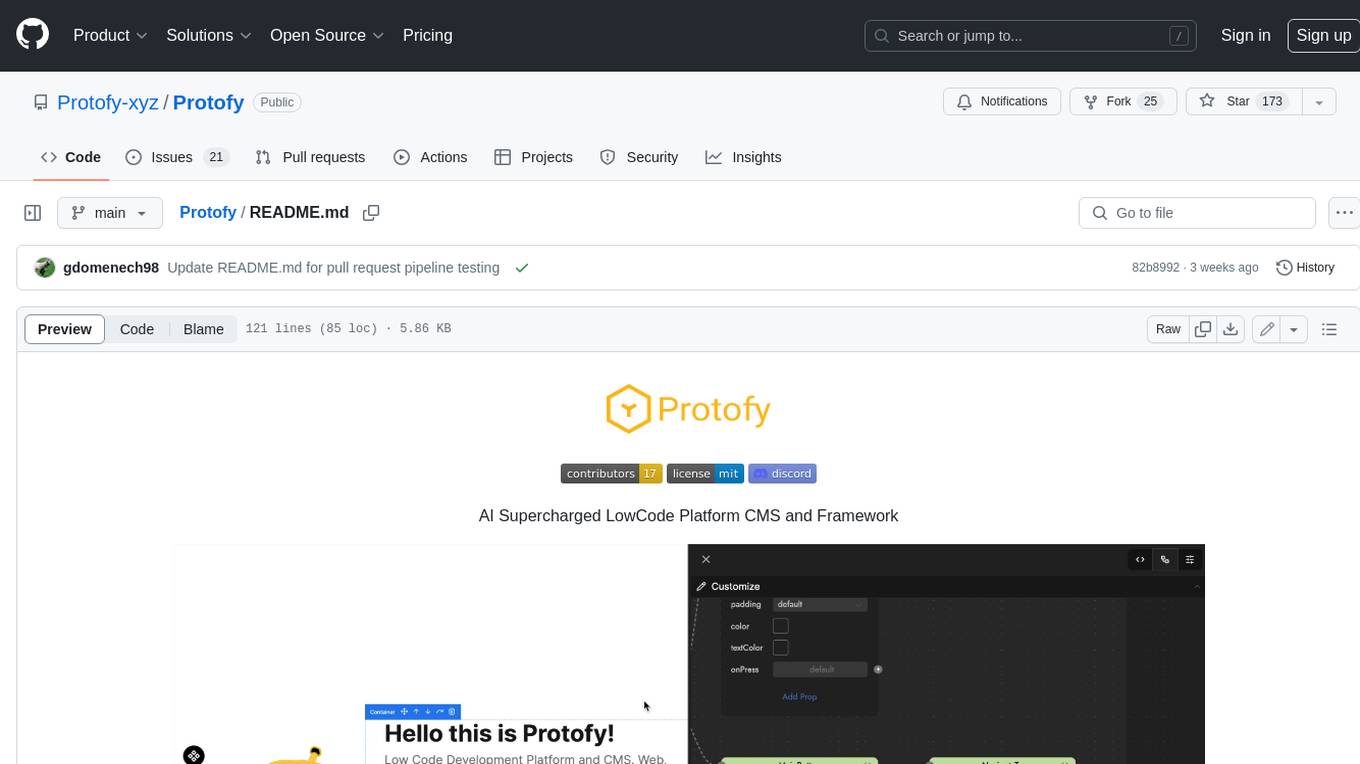
Protofy
Protofy is a full-stack, batteries-included low-code enabled web/app and IoT system with an API system and real-time messaging. It is based on Protofy (protoflow + visualui + protolib + protodevices) + Expo + Next.js + Tamagui + Solito + Express + Aedes + Redbird + Many other amazing packages. Protofy can be used to fast prototype Apps, webs, IoT systems, automations, or APIs. It is a ultra-extensible CMS with supercharged capabilities, mobile support, and IoT support (esp32 thanks to esphome).
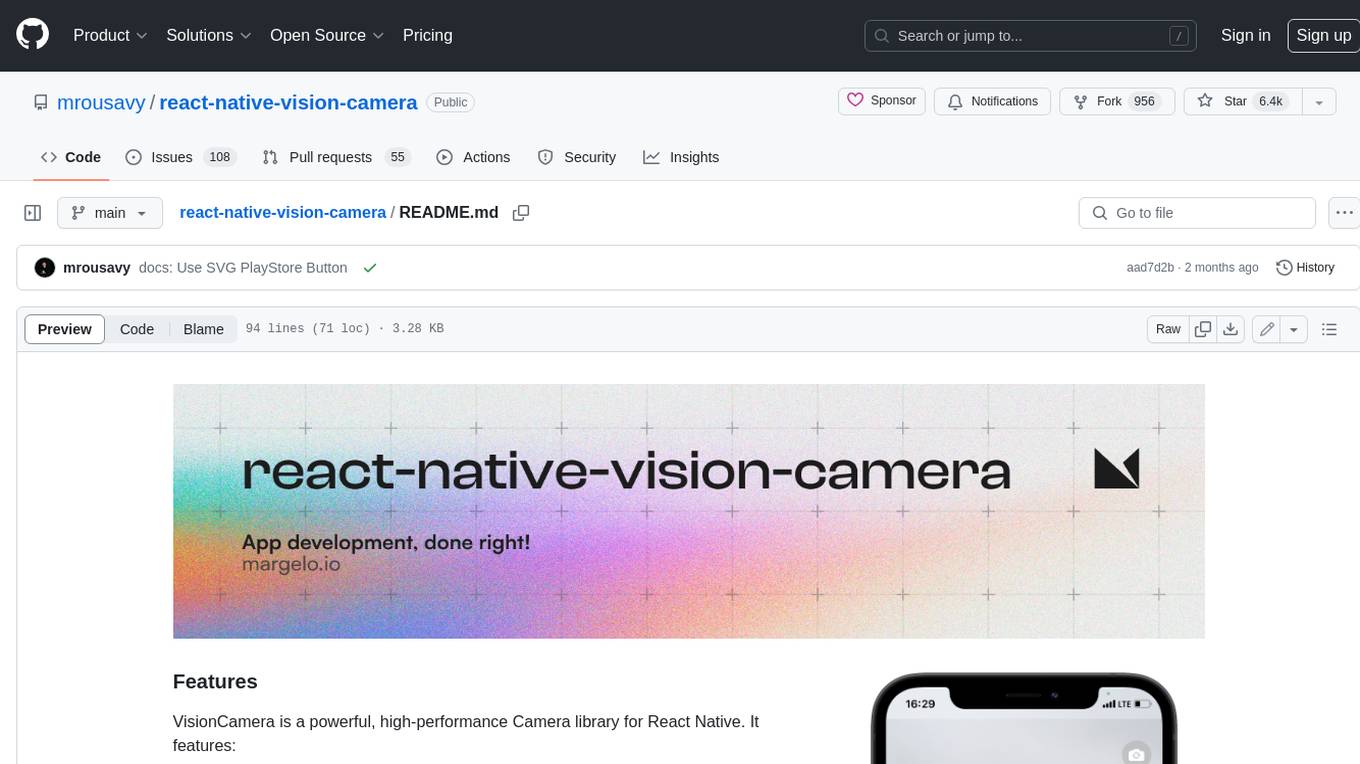
react-native-vision-camera
VisionCamera is a powerful, high-performance Camera library for React Native. It features Photo and Video capture, QR/Barcode scanner, Customizable devices and multi-cameras ("fish-eye" zoom), Customizable resolutions and aspect-ratios (4k/8k images), Customizable FPS (30..240 FPS), Frame Processors (JS worklets to run facial recognition, AI object detection, realtime video chats, ...), Smooth zooming (Reanimated), Fast pause and resume, HDR & Night modes, Custom C++/GPU accelerated video pipeline (OpenGL).
